Adcorp Group CTO

Unathi Thosago
Breaking boundaries
Sasfin Bank CIO
Josh Souchon
From medicine to digital
Momentum Metropolitan CDIO
Dhesen Ramsamy

Engineering meets IT
TIGER BRANDS CIO
MOHAMMED GAUSE ALL ABOUT THAT IT COLLECTIVE

Adcorp Group CTO

Unathi Thosago
Breaking boundaries
Sasfin Bank CIO
Josh Souchon
From medicine to digital
Momentum Metropolitan CDIO
Dhesen Ramsamy

Engineering meets IT
TIGER BRANDS CIO
MOHAMMED GAUSE ALL ABOUT THAT IT COLLECTIVE
Makwa IT Technologies (Pty) Ltd is a leading digital technologies company at the forefront of empowering customers to embrace digital transformation. With a strong emphasis on inclusivity and equity, Makwa IT is a Level 1 BBBEE certified company that takes pride in its diverse business approach. Catering to clients across various industries, Makwa IT offers a comprehensive range of products and solutions to address their unique challenges.
What sets Makwa IT apart is its team of seasoned professionals who possess in-depth knowledge and understanding of modern technology. These professionals work closely with clients, ensuring seamless implementation and optimisation of solutions tailored to their specific needs. Committed to exceptional customer experience, Makwa IT aims to build long-term partnerships by providing clients with the necessary tools and expertise to succeed in the digital era.
Regardless of business size or industry, Makwa IT is dedicated to helping businesses navigate the rapidly changing technology landscape and achieve sustainable success. Trust Makwa IT as your reliable partner for all your technology needs and embrace the transformative power of digital innovation.
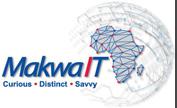



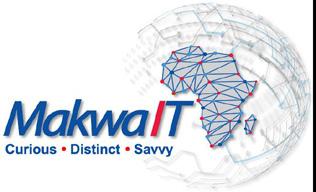
Adcorp Group’s Unathi Thosago believes that people are often rewarded in public for what they do in private, and that if you put in the time and effort, the rewards will follow.


Momentum’s Dhesen Ramsamy is an engineer turned chief digital officer who has spent the majority of his career problem-solving.
Sasfin Bank’s Josh Souchon’s unusual career start.
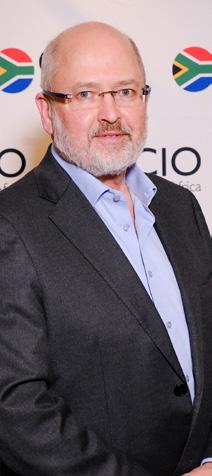
Dr Denisha Jairam-Owthar was once named the youngest person to complete a PhD in IT.
Tsebo Solution’s group IT director Yosheen Padayachee is an advocate for women in tech.
20 All about that IT collective: Tiger Brands’ Mohammed Gause believes that industry-wide issues can be better addressed as a collective
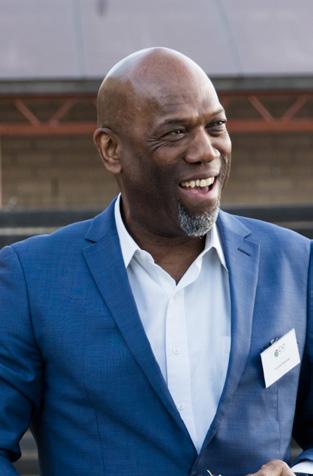
14 CIO South Africa Summits: All the highlights from Johannesburg and Cape Town
26 The 2023 CIO Awards: Welcome to the Oscars of IT 34 CIO Dinners secure IT’s seat at the table
44 Responsible AI: Let’s talk ethics and governance

Nomahlubi Sonjica Community manager nsonjica@cio-sa.co.za +27 71 855 9261
Nick Smith Sales manager nsmith@cio-sa.co.za +27 72 741 6171
Reabetswe Rabaji Managing editor reabetswe@cio-sa.co.za +27 79 636 4463
Ronda Naidu Associate editor
Photography Lizelle Furter, Patrick Furter
Georgina Guedes Content director
Joel Roerig Managing director jroerig@cio-za.co.za
Contributors
Ang Lloyd
Design Elizabeth Ferraris
Printing Novus Print
Publisher
CFO Enterprises (Pty) Ltd
1 Wedgewood Link | Bryanston | Johannesburg | 2191 | South Africa

CIO South Africa is the organisation for IT executives in South Africa. Our goal is to connect IT professionals online and through events and this magazine to share knowledge, exchange interests and open up business opportunities. For more information please visit CIO-SA.co.za.
© 2023 CFO Enterprises (Pty) Ltd. All rights reserved. No part of this publication may be reproduced, distributed or transmitted in any form or by any means, including photocopying, recording, or other electronic or mechanical methods, without the prior written permission of the publisher, except in the case of brief quotations embodied in critical reviews and certain other noncommercial uses permitted by copyright law.
It has been an interesting few months. There's been a lot of buzz about artificial intelligence since the launch of OpenAI’s rockstar chatbot ChatGPT, which took everyone by surprise, even IT’s own seasoned professionals, especially its power, potential, and the risk it presented, as we came to learn at our CIO dinners (page 38)
But I subscribe to the idea that nothing beats the human touch!
My role as managing editor of CIO South Africa is to capture the stories of our community’s CIOs. It's been fascinating to discover how some of the country’s top IT executives have coupled technical expertise with business acumen to steer their various organisations toward profitability and growth. It has been equally intriguing to learn that the IT journey is not always a conventional one.
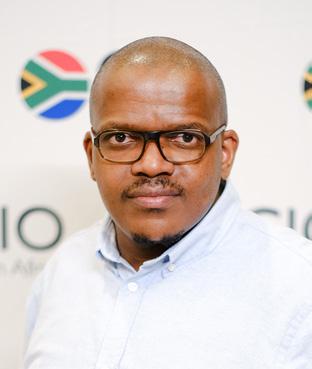
I’ve also come to learn that when it comes to executives, IT professionals have some of the most interesting hobbies out there. In this issue,
you will learn about Josh Souchon (page 42) and Mohammed Gause’s (page 22) shared passion for motorsports, and burning rubber on the racetrack, Dhesen Ramsamy’s love for music (page 32), and Yosheen Padayachee’s occasional weekend DIY projects (page 62). It gets even more interesting because some have had really interesting careers before entering the IT realm, but I’ll leave that for you to find out as you read through.
The CIO South Africa team has grown with a formidable team of expert salespersons, community managers and a rockstar editorial team, who put their exceptional skills on display with the incredible sponsors they bring to the table, top-tier IT executives and now community members, as well the unique content that’s produced.
Our community members are growing too, which was clearly evident at the first-ever CIO Summit in Cape Town in April, enticing even our Johannesburg-based CIOs who joined us at 180 Lounger. It was a sign that word had spread quickly, and Capetonian CIOs enjoyed the rare opportunity to interact with their Johannesburg counterparts (page 19)
The community celebrates its first anniversary this year – and we are celebrating in style by launching the first-ever CIO Awards (page 28), where some of the country's most formidable IT leaders will join us for a gala dinner at the Polo Room to recognise and celebrate the outstanding achievements of CIOs who have demonstrated excellence in leadership, innovation, and technology management. Looking at 2023 and beyond, we will continue to deliver world-class events, unrivalled networking and growth opportunities, unmatched content –and a little more of our “secret sauce”.
Yours sincerely,
Reabetswe Rabaji Managing editor rrabaji@cio-sa.co.za +2779 635 4463
degree in Avionics at the University of Glasgow and holds an MBA from the University of Strathclyde and recently completed Harvard’s prestigious C-suite programme.
In May 2022 Vijay Naidoo took on the role of CIO at Sanlam Retail Affluent, following a successful stint as the CIO of Old Mutual Finance. He says he made the move to Sanlam because the insurer’s mission of instilling confidence through financial freedom resonated with him.
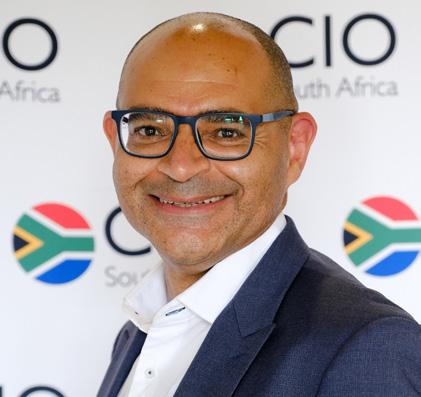
At Sanlam RA, Vijay is responsible for shaping and driving the strategy, as well as the associated demand and IT transformation to build capabilities that will support the business strategies and related objectives.
Ray Naicker took on the role of group CIO at Nedbank in July 2023. The former chief digital officer for the financial services organisation succeeded Fred Swanepoel, who went on retirement.
Ray has more than 20 years of banking experience,18 of which have been at Nedbank Group, where he held various strategic business and IT positions, including playing a key role in formulating the technology strategy and accelerating the group’s digital innovation capabilities.
He graduated from the University of Natal with a BSc Chemical Engineering, the University of
Pretoria with a BEng. (Hons) Technology Management (with distinction), and the University of Natal with an MEng. Engineering Management (with distinction).
Johnson Idesoh took on the role of chief information and technology officer at Absa Group at the start of the year.
Prior to joining Absa, the seasoned professional was the CTO at Old Mutual Emerging Markets. He has also held the role of CIO at Old Mutual and is an executive board member of CABS, a subsidiary of Old Mutual Zimbabwe.
Johnson completed a Bachelor’s
In terms of long-term goals, Vijay says that business agility through effective use of technology is at the top of his list. “I want to drive product innovation and adoption through well-functioning IT delivery teams that can deliver at speed, and ultimately to leverage new solutions to create competitive advantage.”
Wian James has been appointed CTO of Fedgroup, following his tenure as development manager at Evolve Medical Software Solutions. Prior to that, Wian was a senior software engineer at Inter Africa Transport Forex, a role he took on after a stint as manager at
IQbusiness South Africa.
Wian completed an advanced diploma in project management at North West University, as well as a post-graduate diploma in management from the same institution, and holds an MBA from the University of the Witwatersrand (WITS).
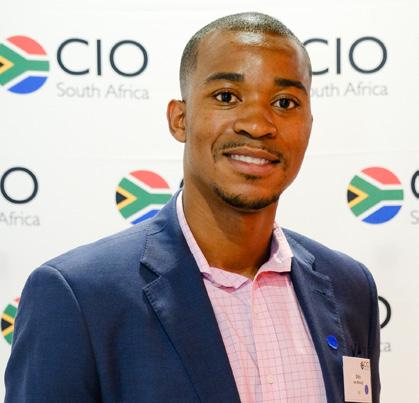
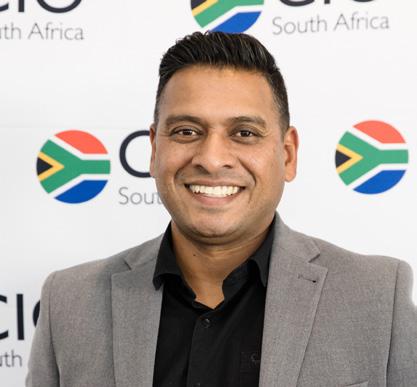
TymeBank has appointed Bruce Paveley as its new CTO. Bruce has 32 years of experience in the technology field, mostly in the banking sector. His experience spans application development, IT, business and fraud operations, architecture, design, AWS cloud and cyber security. He has been with Tyme Group since 2017 as head of technology innovation, data and infrastructure.
Prior to that he held several senior roles at Standard Bank, including head: infrastructure products and services, and spent several years at Faritec, a listed IT services and
solutions company, as a consultant to various companies.
Bruce will be responsible for TymeBank’s IT, cyber and opera-
tions teams and will also play a significant role in introducing new products and services as a key business enabler.
In June 2022, Dido wa Kalonji was appointed as the CIO of Access Bank. Prior to joining Access Bank, he served as CIO at UBS Investment Bank, and before that was a manager of DevOps at Deloitte and a technical support supervisor at MiX Telematics. Dido left UBS to test the entrepreneurial waters and started his own consultancy company, and in the midst of that, was approached by Access Bank to consult on a few projects, during which time he was asked to join as CIO. He holds an MSc in information systems and IT from the University of Liverpool, and a BA in information systems and visual communication from the University of Pretoria.
Unathi Thosago, Adcorp Group’s CTO, grew up in Gqeberha (formerly Port Elizabeth). She was accepted to Rhodes University after matric, but was unsure about what she wanted to study. She attended a course pitch at the university to learn more about her options and gravitated towards the sciences, eventually completing a BSc in computer science.
Final year students advised Unathi not to take that path, because it had a high failure rate. “If you tell me I can’t do it, you’re actually pushing me in that direction,” she says.
Before joining Adcorp, Unathi worked for Rand Mutual Assurance and, as a 128-year-old organisation, the company decided to diversify and move into the funeral cover space. As solution development manager, Unathi led the team that developed that funeral solution.
“It was a very fulfilling project, because it is very rare to come across a legacy company that is actually brave enough to diversify after so many years,” she says. “It was an experience that taught me a lot and brought me great joy –the project was such a success that I was even named the manager of the year.”
She then went on to join Adcorp as the group’s
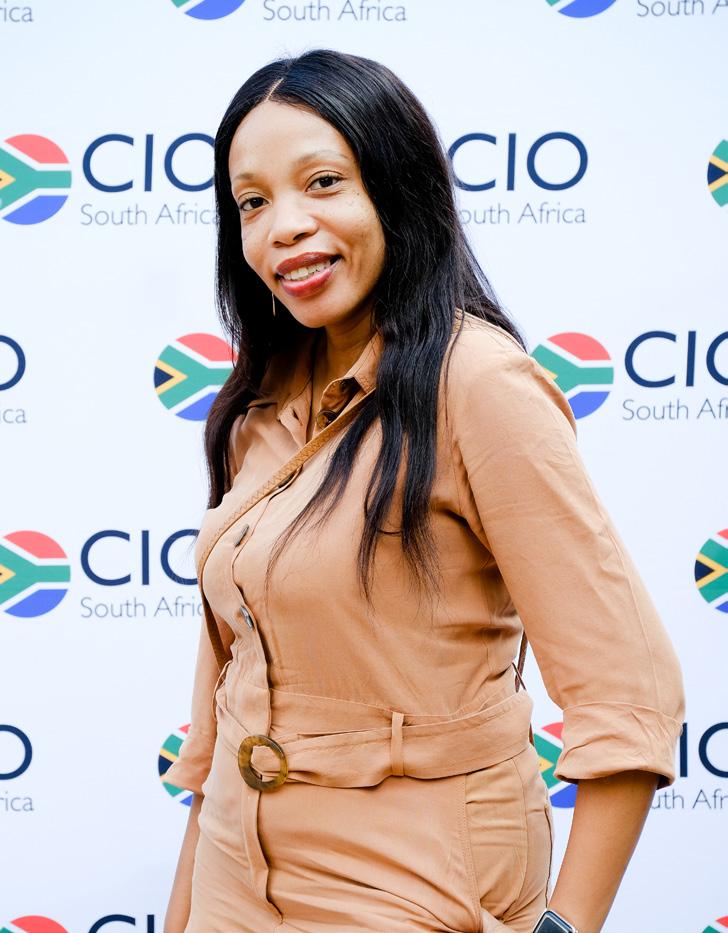
first-ever CTO, one of three women who sit on its board. “We are currently working on a project called ‘Skyhawk’ that I am quite excited about. It is a Workday and Salesforce platform. We will be the first company to introduce Workday Finance into the African continent and this will go live towards the end of the year,” she says. She does, however, point out that being the first company to introduce this system to the continent is a good thing. “It’s not about the tools, but about what they can do for you in the end, and what this system can provide that others cannot. As a result, it must bring value, but it must also create value around it, which gives us a competitive advantage,” she explains.
In terms of the role that women play in technology and the challenges they face, Unathi has concluded that these challenges begin to emerge as early as tertiary level.
“I think the signs begin to show in the third or final year of university: where you started with a full room of eager computer science students with an equal balance of male and female students in the first year. Then, in the second year, the numbers start to fall, and by the third year (specialisation), you realise that female students account for only 10 percent of the classroom.
“However, as a woman, this teaches you resilience. What often happens is that women in tech tend to take the business analyst or test analyst route. Only a handful want to be programmers or work in deep technology, which is why you must be resilient and know exactly what you're getting into,” she says.
Unathi says even when women get into the working environment, leadership needs to play an important role. “I have been very lucky, because I had a manager who supported me and advised me not to try to act like a man, because there are certain values that I bring to the table as a woman that my male counterpart might not. The best lesson I have learnt is to be authentic. If you become your authentic self, it actually takes you much further in life and garners more respect,” she notes.
Female CTOs are rare, she says, emphasising that IT is a very difficult field for women to enter. “As such, serving as CTO has to be my biggest career highlight to date,” Unathi says. “It also positions me as someone who can inspire my other colleagues in the organisation, because they could find themselves in the same situation one day.”
Unathi is also passionate about mentoring, especially mentoring young girls. As a result, she decided to take part in the Project Girls for Girls South Africa programme, a Harvard University initiative. “This programme aims to emphasise the fact that women need each other's support in order to break the ‘queen bee syndrome’,” she says, “and let go of the notion that if one woman has made it, no other woman should.
“To play my part in this initiative, I got involved with the University of Pretoria while I was completing my MBA with GIBS, and Athlone Girls High School. It does take up a lot of time, but it is quite fulfilling to see some of the success stories that come out of it,” she says.
“For example, one girl started planting vegetables in her school residence and once those vegetables
“The best lesson I have learnt is to be authentic. If you become your authentic self, it actually takes you much further in life and garners more respect.”
grew, she went on to give them out to the less fortunate: a great display of being the change you would like to see in the world.”
Unathi believes that, in addition to what you can teach these girls, you will gain some personal insights from the experience. “It teaches you how to be a better public speaker and mentor, as well as where your weaknesses are. You come into this programme thinking you're going to be the mentor, and you end up being mentored yourself,” she says.
Unathi would like to encourage young women to try their hardest to exercise patience and resilience. She stresses that success does not happen overnight. “In life, it can feel like you’re putting in so much effort and getting so little in return. But if you persevere as a woman in this industry, those rewards will come naturally.
“People are often rewarded in public for what they do in private: no one sees the long hours you put in, and by the time you are recognised, so much blood, sweat and tears have gone into it.
“If you put in the time and effort,” she concludes, “you will eventually get to where you want to be.”
AboutUnathi is an experienced executive manager with a proven track record of achievement in the financial services, pharmaceutical, SOE, agriculture, and insurance industries. She cut her teeth as a systems analyst for the City of Tshwane Metropolitan Municipality back in 2008.
She later became a senior supervisor: land assets at Transnet, and held several manager roles at Rand Mutual, including IT solutions development manager, ICT client support manager, and head of project management office at Rand Mutual, before being appointed as Adcorp Group’s first female chief technology officer.
Unathi completed an executive development programme (EDP) at Wits Business School, a post graduate diploma in management: business administration and management at the Gordon Institute of Business Science (GIBS), and holds an MBA from GIBS as well.
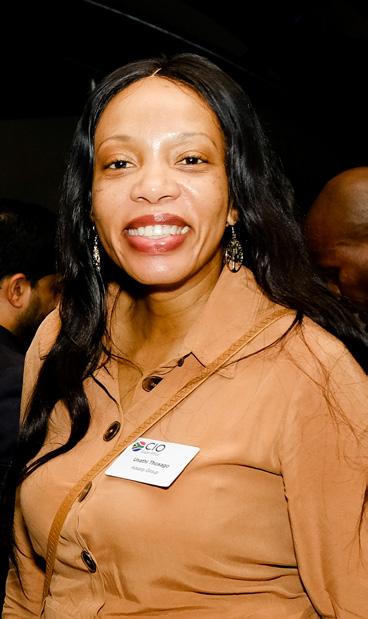
Change was the hot topic at The Bryanston Country Club on 2 March, where technology leaders gathered to share ideas on how to approach the changing business landscape in the right way.
In true, innovative CIO South Africa community fashion, guests were asked to participate in the Post-it challenge on arrival. They wrote down a current change dilemma, and reasons they believe they are the true change champions.
Attendees were asked to respond to two questions: What is your greatest change challenge for 2023? and Why are CIOs real champions of change?
Disruption was a common response to the first question, followed by adapting and adopting to change and keeping resilient and agile.
Other popular responses included managing the costs of change, cybersecurity, lack of skills in security and architecture, as well as fatigue during the change process.
In response to the second question, CIOs’ responses were varied, ranging from strategic to tactical to implementation. These includued understanding the value of technology as a catalyst for change; the ability to think exponentially, and as having a helicopter view of the business.
Joël Roerig, CIO South Africa managing director, kicked off the evening with a quick Q&A on change alongside Alex Fenn, head of innovation at Sibanye -Stillwater, who shared some insights on change using examples from the mining company.
Alex said that it was crucial to leverage partnerships in innovation and to invest in projects that make good business sense while also giving back to the community.
EOH group executive for strategy and change Natasha Andrykowsky’s approach to strategy and change is straightforward: think big while remaining disciplined.
“People try to make strategy very complicated, but it’s about informed choices and timely action. The change process starts when you start planning your new strategy,” she said. “You have to bring the whole business along from the start of this journey, or they won’t buy into the strategy you are selling.”
Nazeem Aberdeen, group IT manager at Sturrock and Robson, concluded that when putting together a strategy, one needs to consider the fact that change is inevitable and that you have to factor in risk and how to mitigate that risk. “It’s almost part of your job as a CIO to have proper mitigation processes in your strategy.”
Successful change strategies require partnerships, transformation – and a ‘smell of the place’.
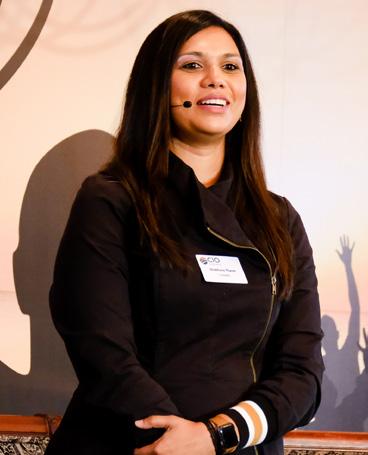
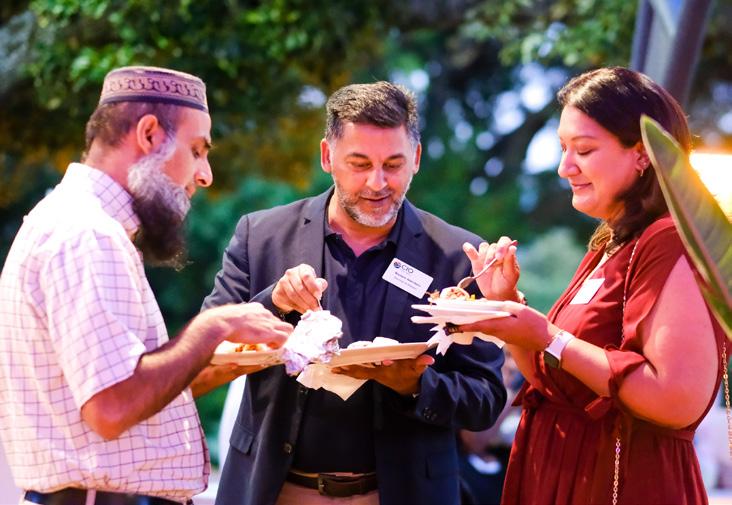
“The culture needs to trigger your emotions so that if change occurs, you are triggered as to what to do next.”
- Shabhana Thaver, CIO at Investec Specialist Bank SA
Shabhana Thaver, CIO at Investec Specialist Bank SA, demonstrated how to foster a culture of change.
“Culture is indoctrinated in who we are at Investec. But I just want to demystify the term culture. Simply put, it’s basically a belief system, the behaviours, attitudes, and values that you sit with, and how we see it at Investec,” she explained.
Shabhana said that Investec employs Edgar Schein’s personal and organisational change approach: above and below the surface.
“Above the surface refers to what you see in the organisation, the structures, governance, and processes – and that doesn’t go away, and it’s sometimes difficult to understand that in a very complex environment,” she explained. “Below the surface is how you really get things done, and at Investec we achieve this through the power of social capital: the networks, the relationships that exist below the surface – our own structure is complicated, and I don’t even understand it at times, but it’s a culture we strongly believe in.”
Shabhana highlighted academic and author
Sumantra Ghoshal’s concept of the “smell of the place” in relation to culture, and how change should not be an event. “The culture needs to trigger your emotions so that if change occurs, you are triggered as to what to do next,” she said.
Toni Serra, CIO at AECI, noted, “When you have low levels of change, and low capability and desire to change in the organisation, it usually results in IT initiatives taking significantly longer than any other organisation. It then costs you a lot more money to execute, it takes a lot longer and one is faced with significant resistance.”
James Farnell, IT operations business leader at Flight Centre Travel Group, said much of this can be solved by getting the buy-in from staff and employees. “One thing that we’ve always looked into is to have that buy-in. Ultimately there is that one big decision that needs to be made to implement the change, but you need to sell it. It needs to be offered on a silver platter and it needs to be sold.”
Warren Hero, CIO at Webber Wentzel, who spoke on people management, said part of the solution to overcoming the challenge of attracting and retaining talent is changing how people think.
“So part of what we have talked about is how to get away from linear thinking and more towards exponential thinking. Our role in our organisations is to make them anti-fragile. And so it’s not about surviving dysfunction. It’s about thriving from disruption.”
Paul Steenkamp, founder and CEO of Jack Frost, took an even deeper dive into change, deconstructing the character, science, design thinking, and discovery-driven innovation that underpins transformation.
Paul’s permafrost concept in the case for change states that good strategies go to the guy at the top and good ideas go to the guy at the bottom, referring to the line manager who plays an integral role in transformation.
“Don’t mess with these guys,” he warned. “You can have exco discussions around idealism, but these are the individuals who ultimately decide whether it’s going to happen: that’s where change starts.”
However, he cautioned against solely putting “gifted leaders” in charge of change projects, because they are often resistant to change.
The evening concluded with attendees discussing their own change challenges and being encouraged by colleagues and peers from other companies and industries who had faced – or are facing – similar conundrums.
The CIO South Africa Johannesburg Summit was made possible by principal partners EOH and MakwaIT; executive partners BCX, SAS and Workday; and associate partners Communication Genetics, Nkgwete IT Solutions and Perpetuuiti
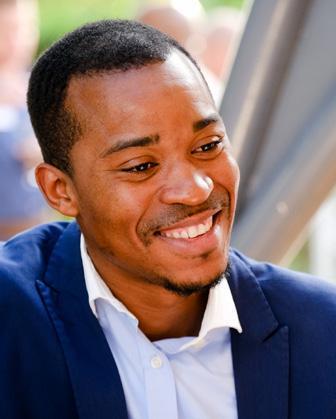
On the 16th floor of the 180 Lounger, with the best and uninterrupted views of the city, IT’s leading minds gathered for an enlightening and informative discussion on artificial intelligence (AI) and the CIO at CIO South Africa’s Summit on 20 April.
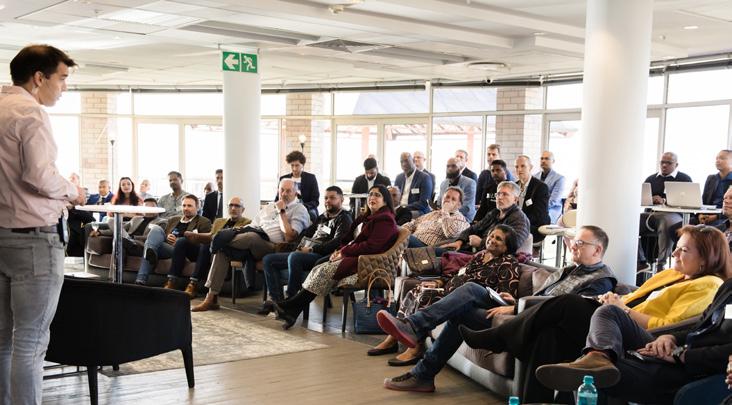
While the list of opportunities and threats posed by AI was seemingly infinite, CIOs admitted that the main difficulty with AI was that people, particularly the workforce, still saw it as a threat to their jobs rather than something that could help them do it better.
“The biggest challenge I’ve seen is the ’people challenge’, and people being worried about whether AI will replace their jobs. However, the human aspect can never be replaced,” said Hungry Lion head of IT Shalendra Singh.
Kosta Kontos, lecturer of the Data Science Leadership course at the Graduate School of Business, University of Cape Town, gave attendees some pointers on how CIOs might put together a future-ready AI team.
He believes that data science should be prioritised as
Artificial intelligence has taken the world by storm, with generative AI currently dominating a number of workplace conversations. IT leaders across industries now have to ponder what this means for their organisations and teams.
“even if we talk about putting together an AI team, we’ll still rely on data science.”
“If you want to build an AI team of the future, you need to look at where you’re at now. Maybe consider a hybrid approach of insourcing and outsourcing talent,” he advised. “Equally so, there are not enough good data engineers in the market and where they are, they get scooped very quickly. You need to be more transparent about remuneration upfront so that they know what’s being offered for that role.”
He added, “Most importantly, delegate and hire the best people and get out of their way. In addition, avoid the ‘brilliant jerks’ – individuals who are very smart but cannot be integrated or connect with the rest of their team members.”
Steven Sidley, author, blockchain guru and professor of practice at UJ, followed with a quick overview on the history of AI. Steven is well-versed in AI and its capabilities as a former global CIO and the first person in South Africa to take an AI course.
“Artificial intelligence is entirely different from all the transformative technologies that have ever been invented,” he said. “AI in principle learns autonomously without our input, it is growing smarter exponentially, and we have no idea what it will look like many years from now. Nobody saw ChatGPT coming: this thing is coming at us at an accelerated speed.”
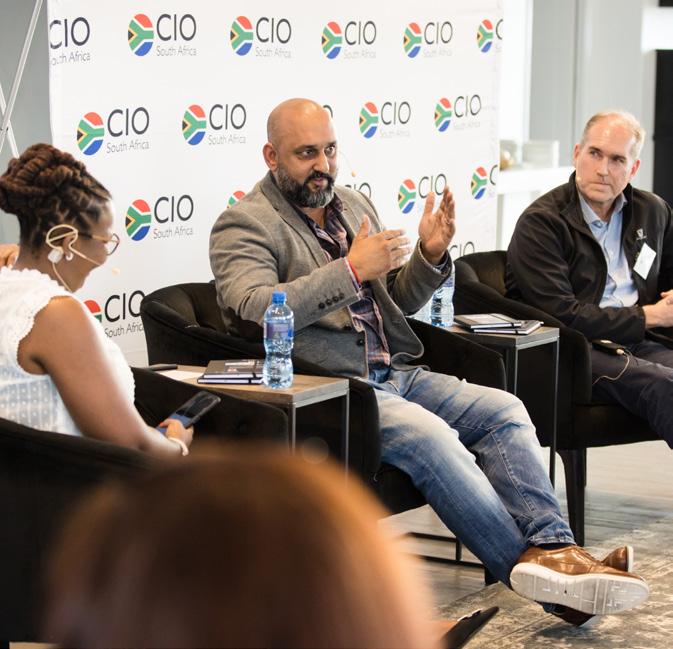
Steven believes that it cannot replace humans, but what it produces or gives people alternative options in terms of what they want to consume, whether it be text or music. It has security, legal and ethical risks, but it’s here – for the long haul – and there is a personal and business case for it.
“Microsoft Copilot, Google Workplace, Bloomberg GPT, Adobe Firefly, Whisper, iGenius, and even a chinese company had an AI CEO for seven months, everyone has
entered the race.”
There is also some excellent research being undertaken in the fields of language and language modelling. Jade Abbottt, director at Lelapa and co-founder of Masakhane, and Farayi Kambarami, head of central planning and data at Woolworths Food, provided guests with insight.
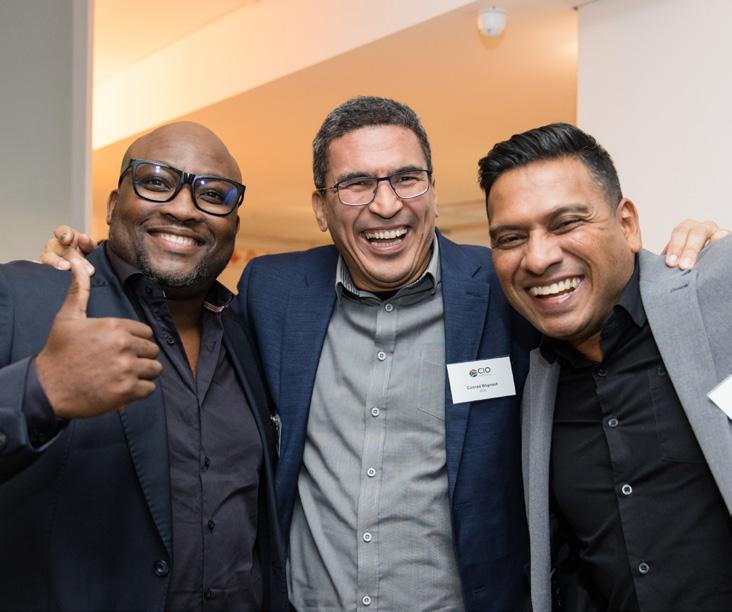
“If you move the clock 200 years into the future, and archaeologists try to understand today, they are going to excavate the information digitally. But, based on what exists online right now, most of Africa doesn’t exist. We need to build technology that can enable people to use African languages on the internet and allows us to express our cultures,” Farayi said.
The CIO South Africa Cape Town Summit was made possible by principal partners EOH and MakwaIT; executive partners BCX and Workday; and associate partner Perpetuuiti
“Delegate and hire the best people and get out of their way.”Lazola Ngqaza (left), Conrad Blignaut (middle), Vijay Naidoo (right)

Tiger Brands’ Mohammed Gause believes that industry-wide issues can be better addressed as a collective.
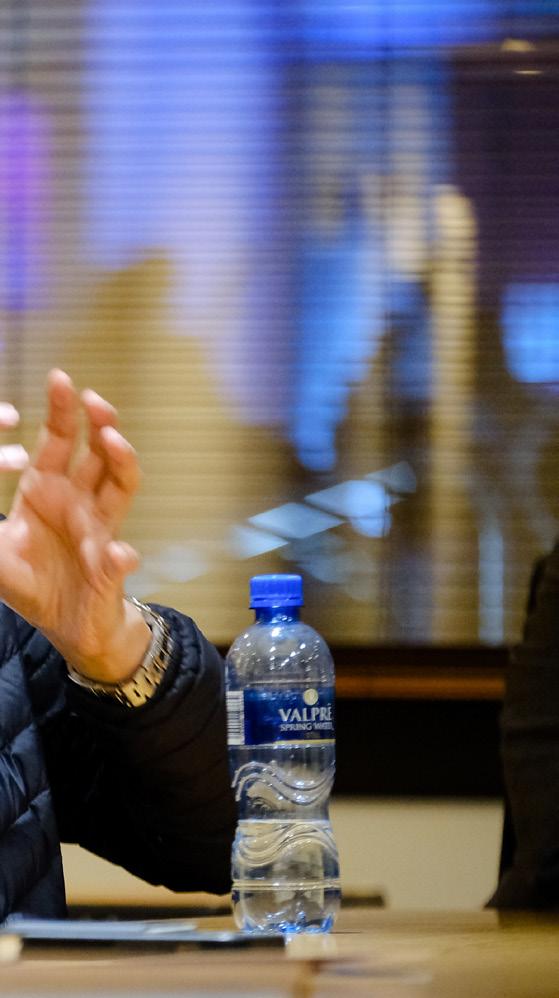 BY REABETSWE RABAJI
BY REABETSWE RABAJI
Mohammed Gause, group CIO at Tiger Brands, grew up in two small farming towns, Escort and Mooi River. He discovered an interesting hobby to pass the time called radio dxing. Mohammed would sit in front of his radio, trying to pick up The Bahamas radio stations on shortwave bands, from Bahamas all the way to Russia, and once he did pick up a frequency, he would write them a letter giving a report on their signal strength or quality. On rare occasions, some of these stations would even respond.
But these days, Mohammed has switched gears a bit. He’s not only a Formula One enthusiast, but has also been behind the driver’s seat on the Kyalami Grand Prix circuit.
“I’ve always had a scientific and enquiring mind and initially wanted to become an engineer, but I never practised as an engineer a single day of my life,” he says. “The U-turn came when a couple of firms came to our university during what was thencalled recruitment week, and I decided to apply for jobs with these firms, just as an opportunity to practise my interviewing skills,” he explains.
Mohammed was then introduced to management consulting, an industry that was at the time in its infancy, through an interview with Accenture. He found it quite intriguing and managed to ace his first and second round of interviews, and in a short time received an offer. Mohammed took the job, but with the intention of working in the industry for a maximum of two years, which ultimately turned into 21 years in consulting.
“I then joined Absa as director, partly because they were at the time going through the largest technology transformation in South Africa,” Mohammed says.
During that period, Barclays had a passive interest in Absa, but two years later Barclays sold its African operation to Absa – which then became Barclays Africa – where Mohammed was group CIO.
At a certain point, Mohammed returned to technology consulting, but points out that with each role that he occupied, he leveraged the learnings from
the previous one, giving him the insight and ability to operate at a business level as well as a technical one.
As far as mentorship goes, Mohammed has not benefited from a primary mentor, but rather from micro-mentors, as he puts it. “These are individuals that I would’ve had an interaction with through the various stages of my career,” he explains. While I did lean into some of them as a sounding board or coach, I preferred to observe and learn from the rest of them.”
“I would often look at a leader and analyse their style and how they responded to situations and use that as a learning point. It’s important to learn from good and bad leaders: I believe you can gain from both experiences,” he says. “A good leader teaches you what you should do and a bad one teaches you what you shouldn’t.
“I can reflect on some of the projects that I have delivered and the successes I’ve had, but there is nothing more fulfilling than seeing somebody where I either had a direct or indirect role in developing their career, and seeing them flourish. That’s what motivates me to come to work every day.”
According to Mohammed, understanding team members is an important part of being a great leader. This includes spending time with everyone in the company to learn about and appreciate the issues and possibilities they face and establishing meaningful interactions by meeting on a frequent basis in a way that has a two-way impact.
Mohammed believes that if leaders demonstrate empathy, people will reciprocate and care about you. “You must ensure that you develop mutual trust and respect with everyone you meet in the organisation.”
Mohammed says there is a disconnect between consultants and people within the organisation. “Consultants often talk about concepts that are geared towards the future and are more applicable down the line. However, there is a lag between the
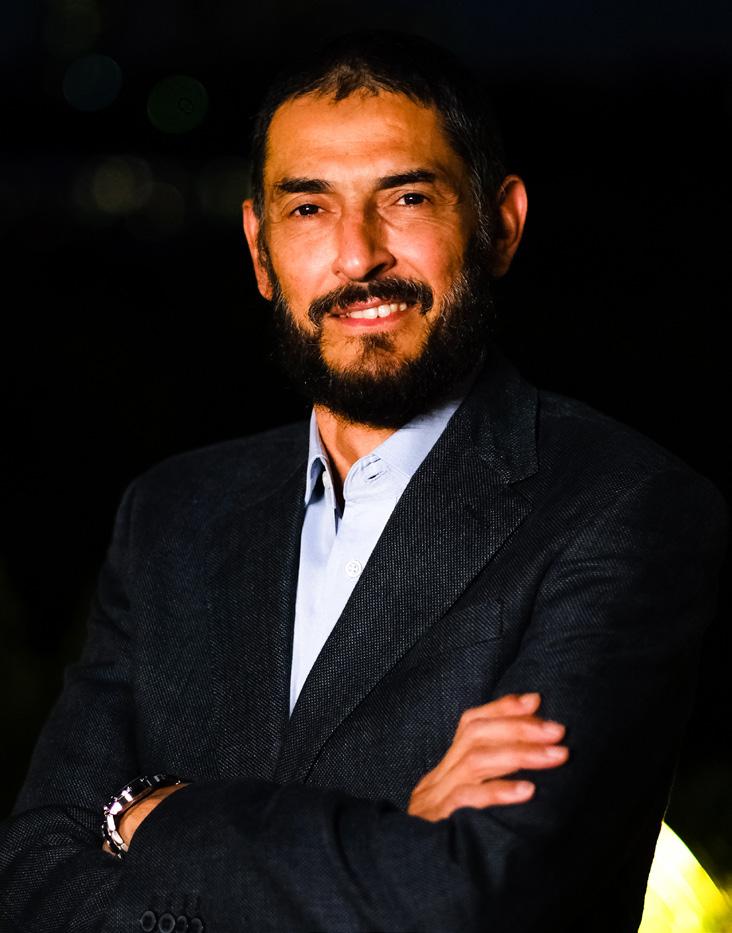
“We cannot share similar problems as a group , but then come up with solutions individually – it needs to be done as a collective.”
applicability of those concepts, new hype cycles starting and what is currently happening at the moment,” he observes.
“CIOs on the other hand deal with the day-to-day challenges and how to solve them: focus on the future, but also deal with the current issues,” he says. “It’s all about finding the balance between how you are gearing up for the future and how you are dealing with the challenges we are all facing in the industry.”
According to Mohammed, one of the biggest problems with the IT body today is information sharing: it’s not happening enough, he believes. “We do discuss issues as a community, but have failed to create something that we can use to take action and drive the solutions,” he notes.
In fact, Mohammed believes that the IT community should have an aspiration to be recognised as thought leaders in the industry. In addition, the community should aspire to get to the advisory level even in positions of influence in government, not only to start influencing decisions, but also co-owning them.
“We cannot share similar problems as a group (i.e. brain drain or skills shortage), but then come up with solutions individually or solely for your organisation. It needs to be done as a collective, as we are stronger as a unit,” he says.
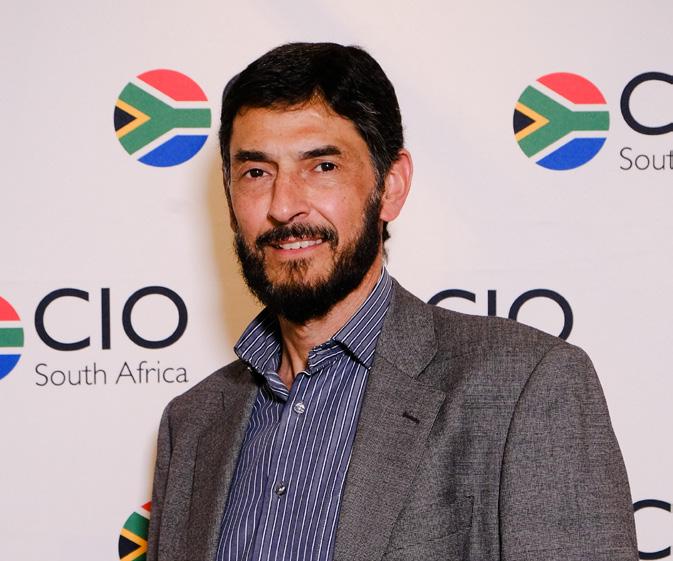
“Engineers are the true modern-day artists and often experts in multiple fields.”
Speaking at the CIO Summit in Johannesburg earlier this year, Mohammed unpacked what it takes to position IT as a trusted advisor as well as business partner.
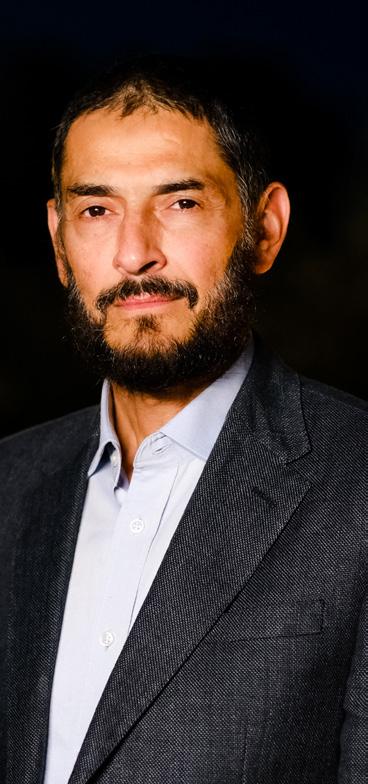
Here are Mohammed’s top four tips for IT professionals to position IT as a business enabler:
1. Get the ‘smell’ of the place: Spend time with everyone in the company to learn and understand the challenges and opportunities they are facing. “You have to get to know the people, the decision-makers, and even the competitors. Visit the factories and the field workers, live their lives and experience their challenges.”
2. Create purposeful encounters: Meet with people regularly in a way that makes a meaningful impact in both their, and your own working life. “Whether it’s monthly updates, quarterly business reviews, or strategy sessions, learn how your team works and create power maps that will help them deliver their best.”
3. Provide relevant feedback: As a partner to the business, a CIO’s job is to deliver data-driven insights to the organisation. “Ensure that you are giving them timely updates on projects and initiatives, include your insights in decision-making processes and solving for issues, and report on metrics that make sense to the business and the industry.”
4. Handle with care: Let everyone know that you care about them. If leaders show empathy, people will show it back and they will care for you too. “You have to make sure you build mutual trust and respect with everyone you encounter in the organisation.”
AboutMohammed Gause is a seasoned IT professional with more than 27 years of experience covering most aspects of the business through his technical knowhow and business acumen. Mohammed is an engineer by training with a BSc degree in engineering from the University of KwaZulu-Natal. He has sat on both ends of the table, one as an IT consultant, and the other as the client. Mohammed is a motorsport enthusiast and when he’s not driving company strategy, you will find him behind the
The inaugural CIO Awards, also known as the Oscars of IT, recognises the country’s leading CIOs, who burn the midnight oil, put out fires, and transform organisations.
BY REABETSWE RABAJIAs one of the fastest growing communities for IT executives in the country, CIO South Africa this year launches its inaugural CIO Awards – to recognise IT excellence in the country.
On the evening of 15 November 2023, CIOs dressed to the nines will walk the red carpet at The Polo Room at the Inanda Club and enter the club's grand function room to enjoy an evening of entertainment, exquisite food, and celebrate the winner of the coveted CIO of the Year, as well as the winners of the nine other prestigious awards.
Before that glamorous awards ceremony, a very essential, detailed and rigorous awards process will take place. Nominations began in April and closed in May 2023, whereafter qualifying CIOs were invited to a two-hour interview with a group of carefully selected and respected judges.
“The launch of the CIO Awards is extremely exciting,” says Joël Roerig, MD of CIO South Africa.
“The black-tie dinner on 15 November will be the
Oscars of IT: an unforgettable night of glitz, glamour, fantastic food and essential networking. At the same time, the 10 awards will go a long way to shine a light on the world-class excellence that has come to typify South Africa’s best IT leaders.”
CIO South Africa’s community manager Nomahlubi Sonjica shares Joël’s sentiments and adds. “The best CIOs are no longer leading IT departments that provide back-office support to businesses and organisations. They are business partners to CEOs and boards, playing a pivotal role in the development and execution of strategy, digital transformation, cybersecurity and smart use of data – future-proofing their organisations.”
There are specific factors that the judges look for in an exceptional CIO and how those attributes contribute to their success.
"Successful CIOs have evolved to be business leaders and advisors to the boards, CEOs, exco and business at large on digital transformation
to create an organisation digital backbone,” said Kholiwe, VP and Country MD at Software AG. “It is key for the CIOs to have the strategic outlook and understanding of overall business imperatives. It has never been as crucial as it is today for CIOs to stay abreast of emerging technology trends. CIOs need to definitely prioritise their quest for knowledge and doing things differently and enable them to help adapt the organisation strategy and execution to emerging trends.”
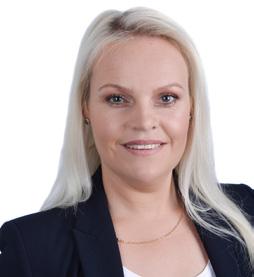
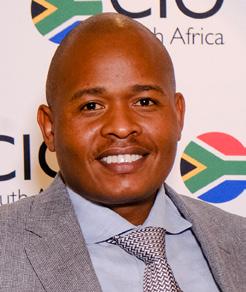
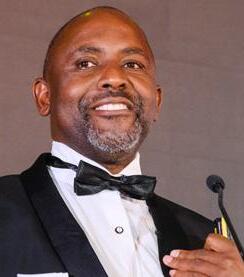
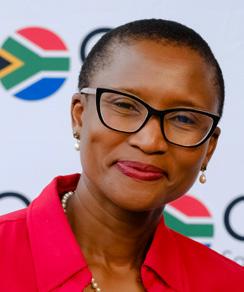
Zuko, who is the area vice-president at Salesforce, said, "When the stakes are high, CIOs and their teams must help the entire company do more with the tools and resources at their disposal. To be successful, CIOs must embrace business intimacy — focusing on ensuring direct alignment with colleagues across every line of business to truly understand their needs."
He added, "CIOs can increase their relevance and ability to deliver business value by bringing a new set of skills and operating processes to the executive table during a radically different business environment."
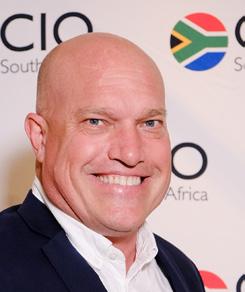
Innovation guru Tendayi Viki said, "The most important quality I look for in CIOs is ambidextrous leadership. Everytime I meet a CIO, I ask myself whether they are the type of person that can leverage the latest technology to keep the company’s core business relevant, while at the same time supporting the exploration of new value propositions and business models. The pace of change in business is so fast these days, that CIOs that are only focused on their core business will not be the most successful over the long term."

The awards being handed out at the annual CIO Awards are:

• CIO of the Year: In recognition of the CIO who has demonstrated exceptional leadership and innovation, contributing to the success of their organisation over a number of years.
• Public Sector CIO of the Year: In recognition of the CIO who has excelled in the government sector.
• Young CIO of the Year: Recognises young IT professionals who are on their way to becoming seasoned IT executives, but have already demonstrated great qualities that have earned them a seat in the C-Suite.
• Strategy & Leadership Award: Recognises a CIO who has demonstrated outstanding leadership in developing and implementing effective IT strategies.
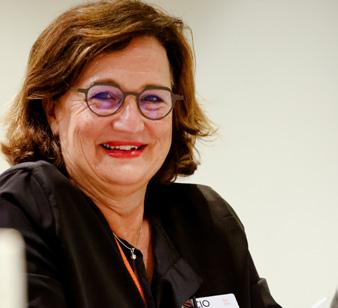
• Digital Innovation Award: Celebrates a CIO who has leveraged emerging technologies to drive innovation and create new business opportunities.
• Smart Data Award: Recognises a CIO who has demonstrated exceptional leadership in leveraging data to drive business value.
• IT Project of the Year: Celebrates a CIO, who has spearheaded a successful IT project that has made a significant impact on their organisation.
• Cybersecurity Award: Recognises those who are always ready to protect the environment, and even if a breach does occur, they have the expertise to respond swiftly and decisively.
• High-Performance Team Award: Recognises a CIO who has built and led a high-performing IT team that has made a significant contribution to their organisation's success.
• Tech Entrepreneur of the Year: Celebrates a South African individual who has demonstrated exceptional entrepreneurial skills in the technology industry.
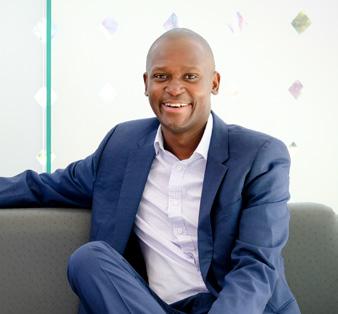
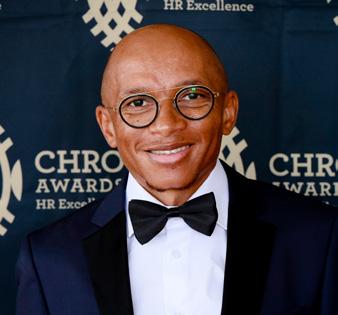
THE OSCARS OF IT
15 NOVEMBER 2023
The Polo Room, Inanda Club, Sandton
Seats are limited, so reserve your seat today at CIOAwards.co.za

Momentum Metropolitan Dhesen Ramsamy is an engineer turned chief digital officer who has spent the majority of his career problem-solving.
BY REABETSWE RABAJI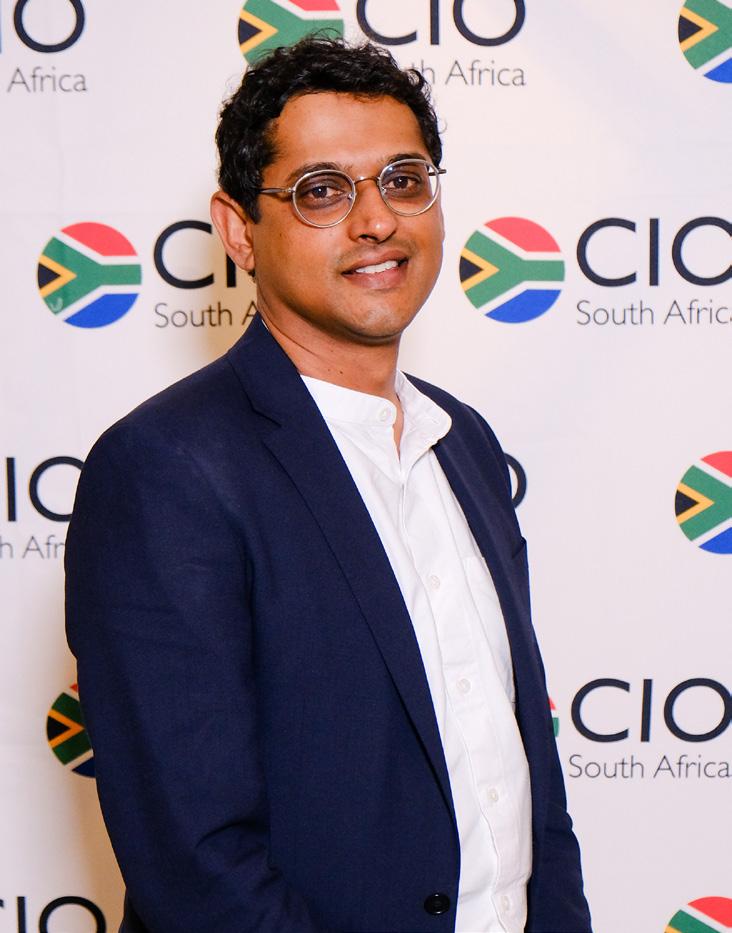
Dhesen Ramsamy, group CDIO at Momentum Metropolitan, is a family man and self-proclaimed music nerd. His favourite genres include folk rock, grunge and reggae music, and he also plays music. “I play the guitar, but I must admit that I’m a terrible guitarist,” he jokes.
Dhesen grew up in Chatsworth in Durban and studied chemical engineering at the University of KwaZulu-Natal. He says his background in engineering left him with both the propensity and love for problem-solving, which comes in very handy in IT. “You might not necessarily be good at problem-solving, but you end up feeling engaged by identifying problems and finding solutions,” he says. “Engineering teaches you how to optimise and find routes to significant issues.”
After completing his studies, Dhesen worked for Unilever where he led product R&D capability for the Africa and Middle East region. “My experience with Unilever left me with a new obsession for solving for the client,” he says. “You walk away from that environment with a proper education and the understanding of solving problems for clients, and not flogging products.”
Cutting his teeth as an engineer for seven odd years, Dhesen wanted to do more, and went on to explore other opportunities in the banking sector. It was perfect timing as the banks were starting to recruit engineers. “I spent my formative years in banking as a process engineer and in customer strategy for Nedbank. So, looking back, I would say that my door into IT was through building and solving client-related problems,” he continues.
He also formed part of a team that developed the country’s first end-to-end mortgage application at Nedbank. “This is how I got into the digital and technology field and not the traditional route of coding or infrastructure development. I then found myself in the retail sector with Woolworths Financial services: they were launching their customer 2020 initiative, a customer-meets-digital roadmap.”
Dhesen also had a stint with TymeBank, where he was involved in developing the bank’s digital frontend, the most noticeable project he worked on being TymeBank’s rewards programme in collaboration with Pick n Pay, and in April 2022, Dhesen was appointed as Momentum Metropolitan’s new group CDIO.
He describes himself as an unconventional IT guy because he didn’t come through the traditional IT ranks of coding and other core IT disciplines. He is both business-minded and also driven by a digital agenda and wants to bridge the gap between the two worlds. “I guess that’s what makes me different, he says. “A distinctive quality that landed me the job I have today as group CDIO at Momentum,” says Dhesen.
“A significant part of my journey at Momentum has been in the digital space. Prior to my current position, I led the digital hub, design and prototyping for the group,” he adds. When Momentum made the decision to accelerate their digital transformation ambitions, he was the first person to put up his hand and drive the agenda.
On talent, Dhesen says that there’s no silver bullet, but insights from some of the research he and his team conducted that reveal more often than not, all people want to know is that they are work-
“What product ownership entails is becoming a digital voice at the table: an IT whisperer to business and a business whisperer to IT.”AboutDhesen Ramsamy is the chief digital information officer at Momentum Metropolitan. He holds a BSc. in chemical engineering from the University of KwaZulu-Natal, completed his MBA at the University of Cape Town – with distinction – and participated in an executive education programme in international housing finance with The Wharton School. One of Dhesen’s favourite hobbies includes playing the guitar, he is still a beginner, but is on his way to mastering those guitar strings.
ing for an organisation that does ‘cool stuff’, as he puts it. And, by that he means experimenting with technology very openly, boldly and loudly – that’s what attracts new tech talent. Furthermore, he says, people want to know that there are opportunities for them to grow and move internally
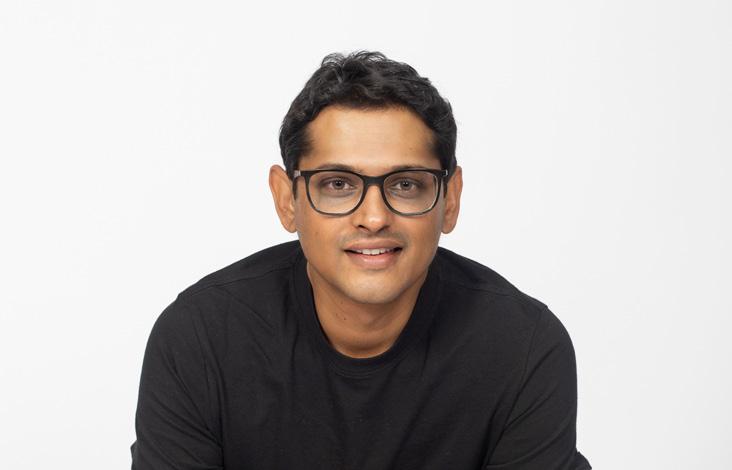
Dhesen says that the main focus for any chief digital officer at the moment should be on getting the rest of the organisation to see that digitally led businesses are the future. Therefore an investment in digital transformation makes a lot of sense.
Business is at the centre of several forces at the moment: on one end there is a consumer movement, the uberisation of business, as he puts it. “Where consumers expect ease of use or frictionless delivery of a product or service, businesses are feeling the pressure from consumers for businesses, but it’s a good opportunity for them to meet those high expectations of service/self-service.
“Financial services is also at the mercy of this rise of digital innovation and technology innovation, namely cloud computing, big data and client use of mobile devices. We must see these technologies as a primary channel today
or the primary channel of the future,” he advises.
He goes on to say that if businesses are experiencing these changing forces, then the traditional role of IT also fundamentally changes, and IT leaders need to secure their seat at the table as a strategic and thinking partner rather than an order taker. “IT leaders cannot lean on some of the things that made them successful before: they need to be at the table when client solutions are being discussed and strategy is being tabled,” he says.
“For the period that traditional IT leaders will not close that gap, I am arguing for the rise of digital product ownership. What product ownership entails is becoming a digital voice at the table: an IT whisperer to business and a business whisperer to IT,” he explains.
Dhesen adds that while traditionalist technologists are making that transition and solidifying their seat at the table, he proposes an effective solution: the rise of a digital leader.
“Digital leaders are people who appreciate both business and the business mechanics, and appreciate the full extent of the value delivery engine to a client or adviser,” he says. “However, don’t shy away from the technology aspect of the business – get involved in the technology delivery engine as well, and understand architecture.”
CIO South Africa kicked off its first-ever dinner at the Saxon in Johannesburg, when some of the country’s top IT executives gathered to share their experiences and lessons learnt during the pandemic.
The dinner, which took place on 26 July, began with a round of “tell us one unexpected, fun fact about yourself”, during which CIOs shared some of the most fascinating aspects of their lives.
This included a CIO who holds a Guinness Book of record for the longest basketball game (83 hours); another who delivered 10 babies, and another whose casual dancing classes led to being a participant in a regional dancing competition.
As the conversation moved to more serious topics, CIOs shared their experiences of leading during a time of crisis. One CIO said that a key objective was implementing a leadership development programme to transform leadership’s way of thinking and approaching things, while another decided to bring in a psychologist to help with the transformation journey, focusing on leading oneself, leading teams, and leading organisations. This involved the entire IT department and influential leaders within the IT
community, which led to IT being allowed to play a stronger leadership role in the organisation.
Another IT leader discussed the difficulties of joining a new organisation where you haven't had the opportunity to meet the team you're supposed to lead.
Some dinner guests said that the importance of empathy for others began to resonate with them profoundly. During those trying two years, the significance of mental health and the importance of getting to know your team members on a deeper and more personal level was highlighted.
During the pandemic, they said, trust and situational leadership became important.
CIOs noted that they needed to be agile to make the right decisions now or pay the price later. According to them, situational leadership also required courage: while everyone else was worried about the crisis, IT had to step up in order to keep the lights on and make those difficult decisions quickly.
Despite the many challenges of the pandemic, a positive unintended consequence was that it demonstrated the critical role that IT plays in the organisation.
There’s no better recipe for creating community than by breaking bread – and this is literally what the country’s leading IT executives were able to do at CIO South Africa dinners, which were held at some of the finest restaurants Johannesburg has to offer.
Those in attendance were:
• Faith Burn, Eskom CIO
• Farieda Mayet, Netstar CIO
• Helen Constantinides, Avbob Group CIO
• Joël Roerig, CIO South Africa managing director

• Josh Souchon, Sasfin Group CIO
• Lungile Mginqi, Sasol Group CIO
• Mduduzi Duey Mohlala, AppDynamics regional sales manager
• Reabetswe Rabaji, CIO South Africa managing editor
• Toni Serra, AECI CIO
• Vallance Subban, AppDynamics regional manager
• Zakes Chibi, Total Energies country IT shared services manager
The CIO South Africa dinner was hosted in partnership with AppDynamics.
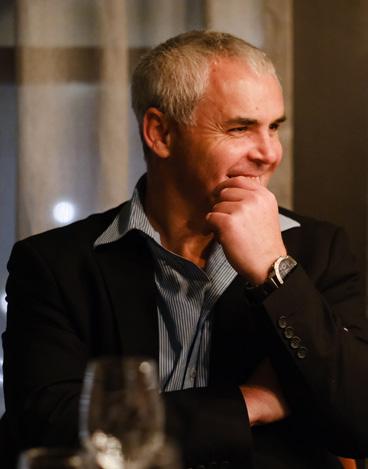
During a dinner at the Aurum Restaurant at The Leonardo in Sandton on 31 August, IT leaders continued the Covid-19 conversation and also shared their views on contemporary topics facing the IT fraternity. This included digital transformation, organisational culture, personas, and the great resignation.
CIOs reflected on the hard lockdown period when employees were working remotely and mentioned that the biggest challenge when joining a company during such a period was trying to build relationships. In addition, the role of IT took centre stage and it was no longer a backdoor function, they said.
One CIO observed that the profile of IT within the business increased: IT now had a voice and could influence agendas. Another agreed, saying it wasn't about IT having a voice at the table, but about IT becoming a hero again.
According to the CIOs, a significant shift occurred in which business looked to IT for direction, which meant that IT needed to understand business jargon. In terms of personas that emerged at one organisation, the first was of a fully remote worker who relied on collaboration for a hybrid working model, another of a leader and executor, and the last of a full-time worker whose
function required them to be in the office.
The CIOs also revealed that hybrid working models created a different problem when looking at the pandemic through a great resignation lens. Key IT talent was leaving the organisation: they were being poached by overseas firms.
CIOs noted that while people have returned to work, one aspect was overlooked: how employees’ lifestyles had changed.
For one CIO, an effective solution has been onboarding for people returning to the office as well as treating people as individuals rather than assuming that everyone works in the same way.
Another CIO noted that the Covid-19 pandemic had accelerated digital transformation, with the most visible areas being in digital money. According to him, most digital tools are built on the premise of creating a sharing/shared economy, and he spoke about companies that have successfully leveraged this system.
At the end of the evening, CIOs agreed that the relationship between IT and business had changed, with the biggest difference being that business now consults with IT – and CIOs are also changing things by educating other executives about technology.
Those in attendance were:
• Cobus Rossouw, Imperial executive vice president: digital & information technology
• Itayi Mandonga, Software AG CTO
• Jacques Claassen, Vumatel IS executive
• Joël Roerig, CIO South Africa managing director
• Justin Freeman, Telesure CIO
• Mohammed Gause, Tiger Brands CIO
• Mthokozisi Moyo, Hollard Insure digital head
• Nigel Mangwanda, Absa chief architect: enterprise functions
• Nkosenhle Ngongoma, Ascendis Health group CIO
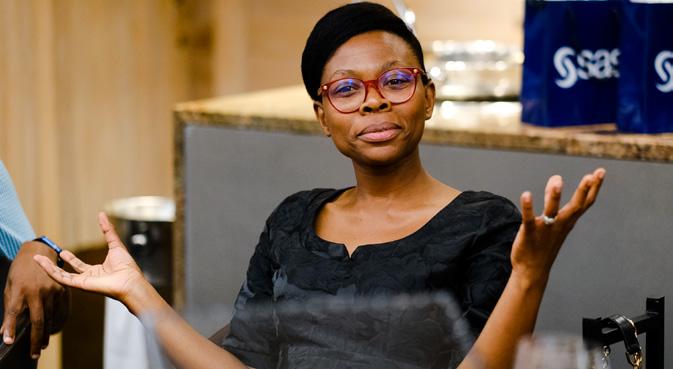
• Patrick Shields, Software AG CTO: global alliances & channels
• Philile Mkhize, Liberty IT executive
• Reabetswe Rabaji, CIO South Africa managing editor
With the close of another year fast approaching, the country’s leading IT executives gathered at the Saxon, on 1 November, for a jovial evening of reflection and networking.
The evening began with a round of introductionsand some surprising tidbits of personal information, including a CIO who had a crocodile living at the bottom of the garden of his childhood home, another
The CIO South Africa dinner was hosted in partnership with Software AG.who owns an F1 simulator and even a CIO who attended school with Princess Charlene of Monaco.
As the conversation moved to country-level, attendees focused on the best ways to respond to the unexpected.
In terms of measuring business temperature, it was noted that the CIO serves as a barometer to gauge how much trouble the business is in or how calm it should be.
From a technological perspective, it was noted that some CIOs often find themselves chasing the next big thing and concentrating on the future rather than the current issues. “It’s all about preserving the present, but thinking about the future,” one said.
Attendees all agreed that one of the biggest issues in IT is a lack of talent, and in order to address this, CIOs must think across the continent rather than focusing solely on South Africa.
There were also challenges related to cloud restrictions.
“Migrating to the cloud isn’t that simple in South Africa; there’s a lot of red tape when it comes to moving into the cloud, especially in specific industries,” one CIO explained. Strict regulations make cloud migration on the continent difficult. In fact, moving to the cloud is illegal in some African countries, with severe penalties imposed. “CIOs have a significant role to play in cloud education, particularly around regulation and policies,” one IT leader said.
Another guest mentioned that data sovereignty is important because no one knows when the next war will happen, so protecting that information now is critical.
Those in attendance were:
• Faith Burn, Eskom CIO
• Joël Roerig, CIO South Africa managing director
• Johnson Idesoh, Old Mutual Group CIO
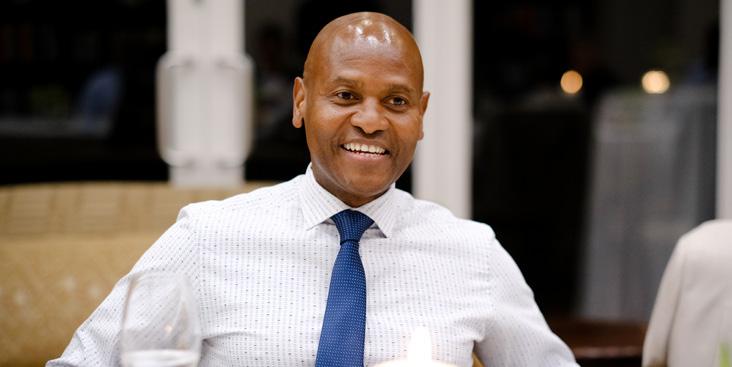
• Jörg Fischer, Standard Bank CTOO
• Kim Sim, Mr Price CIO
• Lungile Mginqi, Sasol Group CIO
• Mohammed Gause, Tiger Brands Group CIO
• Reabetswe Rabaji, CIO South Africa managing editor
• Stephen Van Coller, EOH CEO
• Willie Stegmann, Vodacom Group CIO
• Ziaad Suleman, EOH chief commercial officer
The CIO South Africa dinner was sponsored by principal partner EOH.
On 16 February, top CIOs gathered at the Cellar Door at the Four Seasons Hotel in Westcliff, to look at focus areas for 2023.
Starting with the personal, one CIO revealed that he had started an unusual morning routine of taking deliberate cold showers, as it builds mental strength and prepares you for the day. Another planned to compete in a triathlon.
As the evening progressed, the topic shifted to technology
and how quickly it has advanced, with AI chatbot ChatGPT and its popularity being a hot topic. Almost all the techies in the room had tried it out, both personally and in their day-to-day work, and were blown away by how impressive it was.
“It’s a powerful tool that can be used for good, but it can also be used for nefarious purposes,” one CIO said.
Another CIO said that it inspired his team to launch an innovation day at their organisation to see what kind of ideas and technology they can develop, but he, too, was concerned about it being a threat from a cybersecurity perspective.
Looking to the year ahead, CIOs said that the biggest challenge for business was budgets and different departments competing for them. They believe that accelerating delivery is a matter of managing budgets and dealing with legacy issues. According to them, legacy issues necessitate a different approach – spending faster to solve a problem in a shorter period rather than spending many years trying to get a project to land.
Those in attendance were:
• Ashley Singh, Sanlam Corporate CIO
• Essie Mokgonyana, SAS country manager
• Joël Roerig, CIO South Africa managing director
• John Vaquer, SAS principal business development manager
• Josh Souchon, Sasfin Bank CIO
• Justin Freeman, Telesure CIO
• Lungile Mqingi, Sasol CIO
• Mohammed Gause, Tiger Brands CIO
• Nomahlubi Sonjica, CIO South Africa community manager
• Reabetswe Rabaji, CIO South Africa managing editor
• Stephan Wessels, SAS head of customer advisory
• Trishen Moodley, Liquid Telecoms head of IT
• Viren Naidu, Hollard Insure CIO
Leading women CIOs took table talk to a new level, focusing on cybersecurity, power and AI at the very first CIO South Africa Women's Dinner, which aptly took place on International Women’s Day (8 March), at Ethos Restaurant in Rosebank.
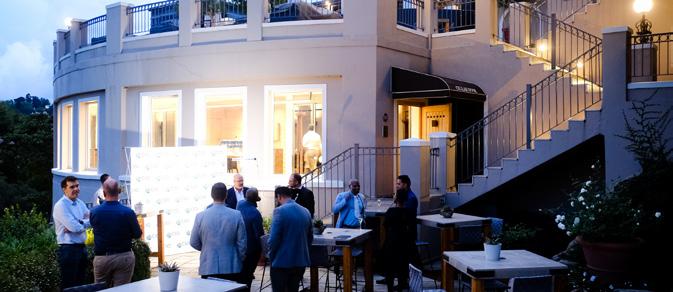
Themed ‘Tech trends that keep you awake’, the dinner gave female CIOs a unique opportunity to share thoughts on challenges and solutions experienced within their organisations.
The dinner began with Andile Ngcaba, founding partner and chairperson at Convergence Partners speaking about the importance of having green data centres. He said the industry is starting to be noticed from an environmental perspective and it is important to adhere to world standards as such. He encouraged South Africans – despite the present power crisis – to look to themselves for solutions around this.
The conversation then turned to challenges being
faced by the IT fraternity. This included the issue of gender equality within the C-Suite. Many at the dinner table said that they were “used to being the only woman on the board”.
In addition, CIOs highlighted the rapid rate at which AI is developing. While it is exciting and people are experimenting with AI, one CIO said, there is a concern about biases in AI models. As a solution, she suggested that it would be a good idea to be involved in the training of AI as a black South African woman.
Another CIO raised the issue of cybersecurity or lack thereof associated with the tools especially with the access given to AI like ChatGPT.
Other challenges which were explored on the night included the expectations to deliver IT solutions in cost-constrained environments and the difficulties connected to developing and retaining young local talent in a global competitive environment.
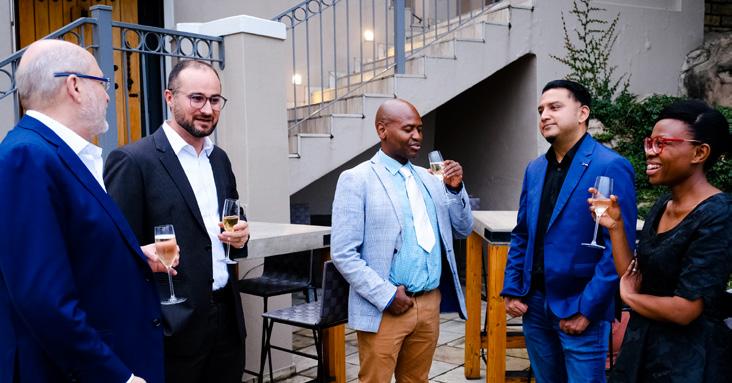
At the end of the evening the CIOs all expressed their appreciation for the opportunity to get together and share their challenges, and think of solutions, not only for each business, but for the entire country and continent.
Those in attendance were:
• Andile Ngcaba, founding partner and chairperson at
• Avhatendi Zwane, head of Centre of Enablement at Liberty
• Faith Burn, Eskom CIO
• Georgina Guedes, CFO South Africa executive community manager
• Keneilwe Gwabeni, Telkom CIO
• Kholiwe Makhohliso, Software AG country MD
• Lulekwa Mcwabeni, Likwezi Consulting CEO
• Makano Mosidi, PIC chief technology officer
• Mmule Sapula, Nutun IT executive
• Nomahlubi Sonjica, CIO South Africa community manager
• Phumza Dyani, SADC Lead: PMI
• Thato Sopeng, Sasol CIO
• Vuyokazi Menye, National Housing Finance Corporation CIO
• Zanele Majeke, Standard Bank CIO
The CIO South Africa Women’s Dinner was hosted in partnership with Software AG.
Following the success of the CIO South Africa Women’s Dinner, community manager Nomahlubi Sonjica will be hosting a quarterly CIO South Africa Women’s Circle – a platform for women CIOs to brainstorm ideas and discuss burning IT issues. If you would like to contribute to this platform, you can get in touch with Nomahlubi at nsonjica@cio-sa.co.za.Josh Souchon, group CIO at Sasfin Bank, was born in Pietermaritzburg, but his family moved to Zimbabwe when he was a child.
While in high school, he applied for two university scholarships, one local, and one abroad. He was successful for both and left to study engineering at the Imperial College of London.
“My final-year thesis was based on mechanical devices for paraplegic individuals,” he says. “I had two paths I could pursue: the first path being the postgraduate medical engineering field, and the other being medicine. I returned to South Africa to
study medicine at Wits, and at that stage, the country was experimenting with the idea of community service.”
Josh ended up working at Chris Hani Baragwanath Hospital in Soweto for his obstetrics block, delivering 10 babies in that period, and in his fourth year electives, worked at St. Joseph’s Hospital with an ENT surgeon, where he performed various procedures.
But Josh was conflicted; he was still undecided about his career path, his wife already had a steady job, and he was worried about being assigned to a hospital in another province. “I decided to take a gap year after my fourth year of medicine, but eventually went back to engineering,” he says.
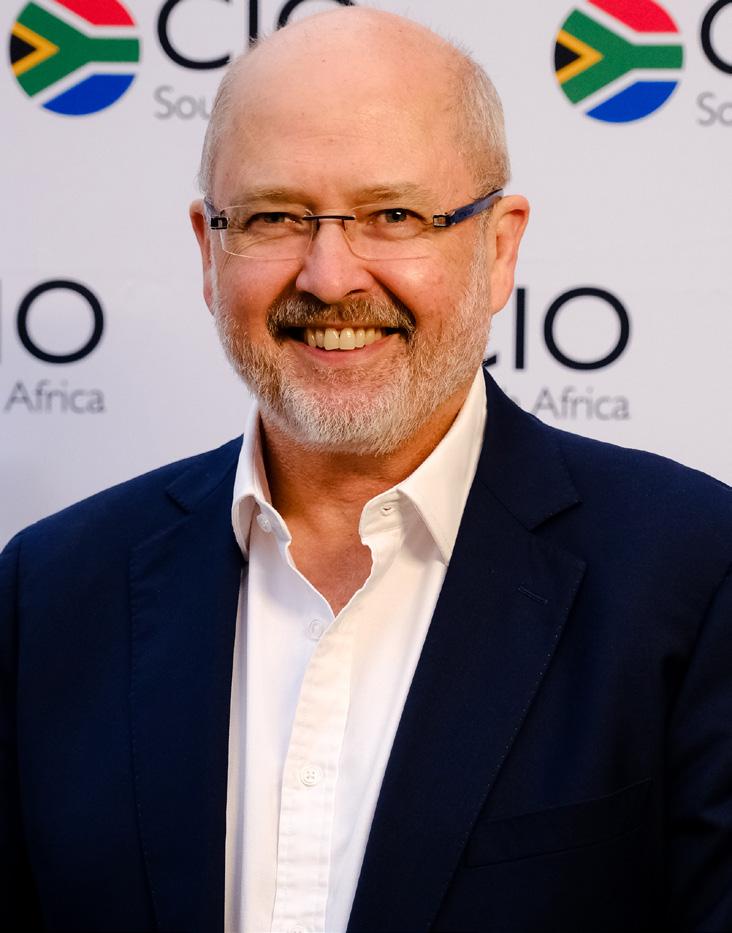
“If you have been employed to complete a project, and you are not confident that it can be done, then you have a moral obligation to leave.”
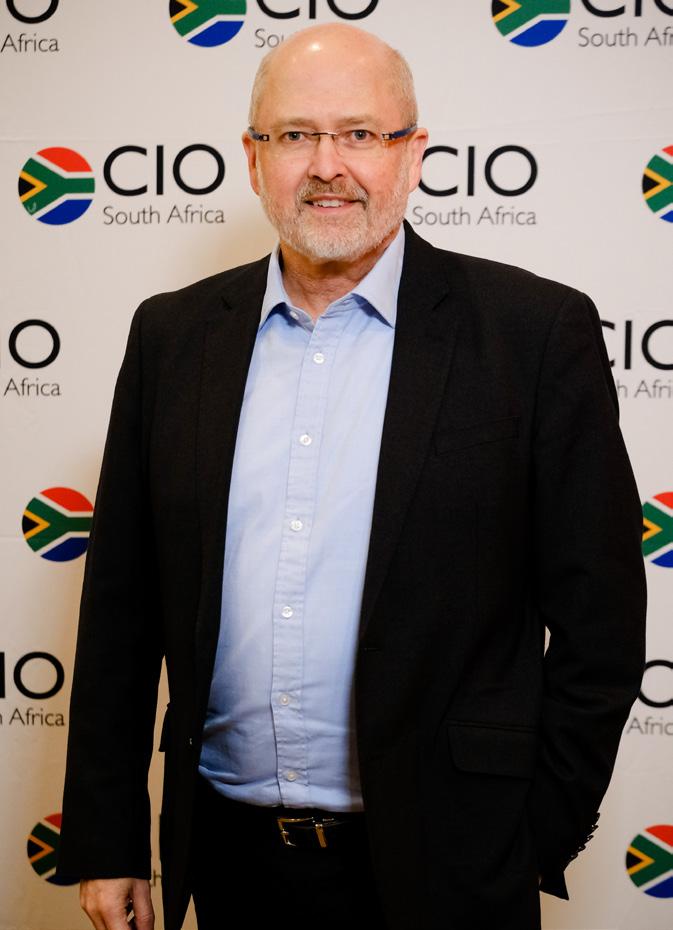
He joined Anglo American, and later De Beers. He also worked for Affinity Logic, a joint venture between WoolTru and Datatech at the time, mainly doing IT projects. “I left Affinity and joined another joint venture project between American Bank, Capital One and Nedbank, where I also ran IT/tech projects,” he explains.
After a successful career in South Africa, Josh decided to work in Europe, and initially lived with his sister in London while looking for work, accepting a role with Trafigura, a position that was based in Switzerland. “I flew back to South Africa, put my home on the market on a Sunday, it was sold the next Monday, and I moved my family to Switzerland.”
He says Switzerland is an amazing place to live and work. “The one thing I would say about Switzerland is that anywhere else you go on holiday is cheaper than Switzerland: going on holiday is cheaper than staying at home!” he jokes.
Josh loves to travel, and is also a Formula One enthusiast and proud supporter of Mercedes-Benz driver Lewis Hamilton. “I also enjoy reading books on business philosophy and leadership, as well as quantum mechanics.”
Josh found his role at Trafigura fulfilling. The company had locations across 32 countries, which afforded him the opportunity to travel extensively. But when the global financial crisis hit, it created a moral dilemma for him, and he had to quickly decide on his next move.
“‘Why leave if they are happy to pay?’ a friend asked me at the time,” he recalls. “I was being paid a premium (100 percent) for the projects I was working on, but in reality I was only doing 70 percent of the work – getting 30 percent extra pay that I didn’t deserve. Based on my own ethical and moral stance, I simply felt uncomfortable staying on.”
He decided to leave Switzerland – he flew out on a Friday and started his new role as head of IT with Investec Capital Markets the following Monday.
Josh spent five years with Investec and achieved great success there. His biggest achievement was creating an IT system for each of Investec’s 16 business units. And by the time he left, the trading business, treasury and specialised finance all ran on their own systems.
His successful run didn’t end there, as he thereafter took on the role of programme executive at Standard Bank transactional products and services (TPS): CIB, Josh managed to complete a project that was seven years behind
schedule. “Standard Bank was struggling with a particular project, which they had already invested heavily in, and in the 23 African countries where this project was meant to go live, had not implemented a single country,” he says. “I agreed to come on board and six weeks later we rolled out Kenya and continued to roll out a series of countries every two months thereafter.”
According to Josh, the project was not delayed due to the lack of technical ability, as they had world-class people working on it. It had more to do with the individuals involved not believing that they could deliver on the project.
“It’s simple,” he says. “If you have been employed to complete a project, and you are not confident that it can be done, then you have a moral obligation to leave. The job is the outcome, not merely coming into the office.”.
When Josh later moved to Sasfin, his main goal was to drive modernisation and digitalisation at the bank, and pivot the entire business. Prior to this, the bank did everything face-to-face: it had a webpage, but that was the limit of its digital presence. In 2017, Sasfin went live with the first digital components for their wealth business, in 2018 digital banking and accounting lite went live, and in 2019 the digital offering for their asset finance business was added.
As CIO, Josh is responsible for enabling growth within Sasfin's businesses and leveraging last mile enhancements that help the businesses scale. In addition, he manages the appropriate resource model, implementing hybrid and new ways of working to effectively deliver the optimal staff output.
He is also in charge of the bank’s cybersecurity, which is a critical foundation for a business that has rapidly shifted to digital over the last five years.
"Some of my most notable achievements at Sasfin include successfully implementing the group’s IT operating model, which is aligned with the business model, as well as implementing the IT Unitised Costing model in the organisation,” he notes.
“I’ve also overseen successful implementations of B\\ YOND (Sasfin Online Banking Platform) and the Business Banking app, and a variety of cloud-based solutions.”
However, Josh's proudest achievement to date has been to transition the company to an entirely remote workforce working from home, without losing a single deal in their pipeline, during repeated Covid-19 lockdowns.
Artificial intelligence (AI) is the defining technology of our time. It is increasingly embedded in all applications, platforms and software, and is used in workplaces, home offices, academic institutions, research labs and manufacturing facilities around the world to help everyone from scientists and salespeople to farmers, software developers and security practitioners.
Benefits like the automation of largely administrative and manual tasks, free up time for workers to focus on higher value tasks, for example healthcare professionals would be able to spend less time on administrative tasks and more time with their patients. AI can also detect unusual behaviour on banking accounts and reduce fraud in financial services and enable predictive maintenance in manufacturing. These examples scratch the surface of the advantages AI can offer across almost every industry.
As more businesses begin to experience these benefits and the use of AI becomes more prevalent and ubiquitous, it will become more critical to leverage it in a responsible way. Responsible AI has in recent years become a key theme in the enterprise AI market, as more companies struggle with challenges in governance, security and compliance.
South Africa has an innovation mindset and is wellplaced to take advantage of AI tools, but it is critical
for business leaders not to delegate the responsibility for AI and other technologies elsewhere in the business – they need to understand the risks and opportunities associated with these technologies, and look at the business through this lens and with a technological mindset.
We have developed a set of AI principles to help business leaders understand these risks and opportunities. The principles aim to act as an ethical framework against which AI solutions are developed and deployed for the benefit of all, and are made up of four core principles – fairness, reliability and safety, privacy and security, and inclusiveness. These are underpinned by two foundational principles: transparency and accountability.
Combining these principles to leverage the technology in a responsible way with a technological mindset and understanding of both the risks and opportunities of AI has the potential to not only drive widespread business value, but also create benefits for broader society.
As consumption of products and services built around AI and machine learning (ML) increases, specialised actions must be undertaken to safeguard not only the business and its data, but also to protect its AI and algorithms from abuse, trolling and extraction.
Practising responsible AI by design does not eliminate all risks, but it does encourage organisations, leaders and developers to be clear about any lim-
As more businesses are experiencing the benefits ofAI and its use becomes more prevalent and ubiquitous, it will become more critical to leverage it in a responsible way, writes Ravi Bhat, chief technology officer and director of commercial solutions area at Microsoft Africa.
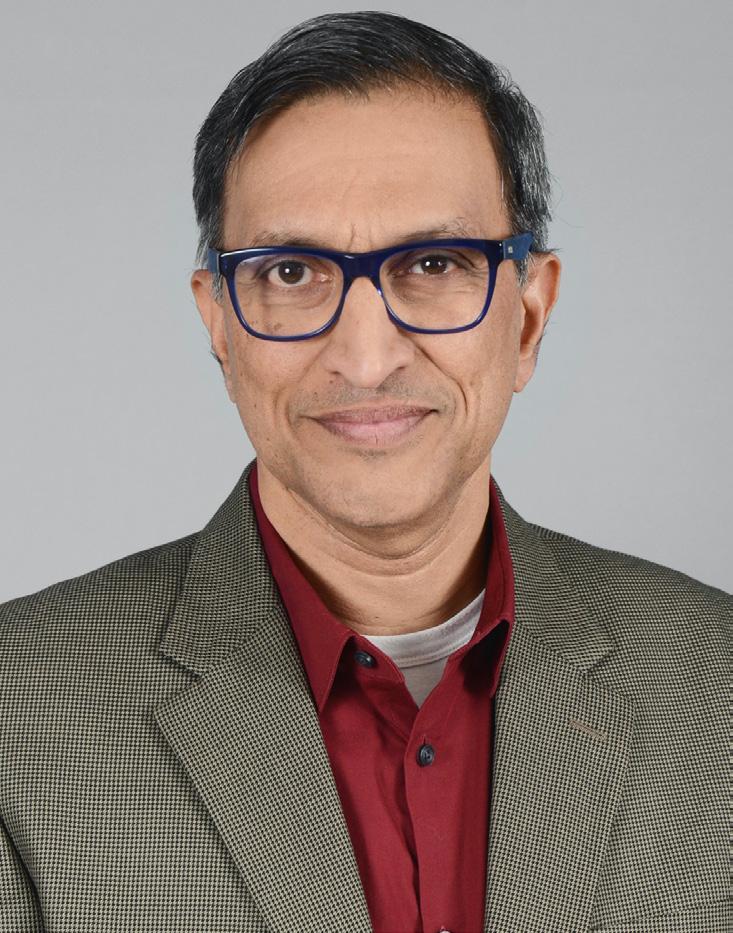
“History teaches us that transformative technologies like AI require new rules of the road.”
itations, account for intended uses and potential misuses, and think expansively about how to secure the benefits of a system and guard against its risks. With the right guardrails, cutting-edge technology can be safely introduced to the world to help businesses accelerate their digital innovation to become more agile, resilient and competitive in an unpredictable economy.

History teaches us that transformative technologies like AI require new rules of the road.
Proactive, self-regulatory efforts by responsible companies will help pave the way for these new laws, but we know that not all organisations will adopt responsible practices voluntarily.
Countries and communities will need to use democratic law-making processes to engage in whole-of-society conversations about where the lines should be drawn to ensure that people have
protection under the law.
Effective AI regulations should centre on the highest risk applications and be outcomes-focused and durable in the face of rapidly advancing technologies and changing societal expectations. To spread the benefits of AI as broadly as possible, regulatory approaches around the globe will need to be interoperable and adaptive, just like AI itself.
As AI becomes a critical tool for organisations and individuals to stay productive, improve operational efficiencies and build resiliency to remain competitive, a commitment to listening, learning and improving is paramount.
Wide-ranging and deep conversations are needed as well as a commitment to joint action to define the guardrails for the future. By working together, we will gain a more complete understanding of the concerns that must be addressed and the solutions that are likely to be the most promising.
Now is the time to partner on the rules of the road for AI.

HARDWARE | SERVICE | SUPPORT
We are a proudly South African company bringing you high performance laptops and tablets.
We provide superior quality hardware at highly competitive prices.
We design locally, source globally and support nationally.
Dr Denisha Jairam-Owthar, chief director ICT at Stellenbosch University, recently relocated to Stellenbosch from Johannesburg. It has been a significant – and crucial – move for her.
“I would describe the move as both challenging and exciting: I felt like that it was necessary to relocate for my career and growth as well,” she says. “I do miss Johannesburg, having spent 20 years in the city: I think it is one of the most progressive cities in the world, and that’s the one element I miss the most.”
However, Denisha does still travel back and forth between Cape Town and Johannesburg, for work and to visit relatives. “I sit on several boards, where I bring
in the IT specialist element and interrogate their CIOs. I actually wish I had counsel that would interrogate me,” she jokes.
“What you are starting to see is that the audit and risk committees are now ensuring that there is an IT expert as part of their committee. Additionally, the board of directors are also making sure that there is an IT expert who forms part of the board,” she explains.
She believes that this trend is a result of committees and boards starting to realise the critical role that IT plays in these organisations. “More so, a need for credible skills in IT and this is where I think my PhD in IT comes in: it gives me the credibility I need to justify or reinforce my position on these boards,” she continues.
Dr Denisha Jairam-Owthar was once named the youngest person to complete a PhD in IT. Today, that doctoral qualification comes in very handy – giving her added credibility as a board member.
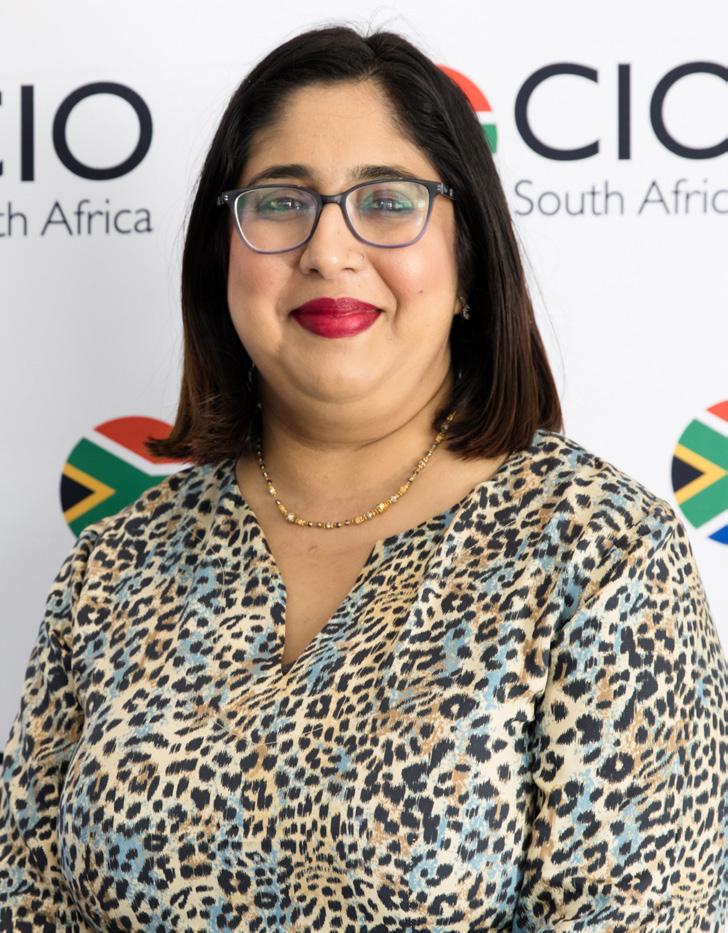
“I sit on these boards because I am passionate about educating board members about the importance of IT. They find IT intimidating and too technical, but when you explain IT architecture for instance, in simpler terms – then the acquisition of products and investment in projects starts making more sense.”

Denisha holds a PhD in IT from the University of South Africa and at the time – aged 33 – was named the youngest person to obtain this qualification.
It was an interesting time when she obtained her PhD, as she was still in corporate, and her peers questioned why she was still in industry with a doctorate. “The notion is that when you have a doctorate, you should therefore be in an academic field or heading in that direction,” she observes. “However, those boundaries only exist in your mind. There are no boundaries. She adds that having a PhD was quite beneficial, because she had access to credible sources, including academic journals or well-researched papers, that she could apply to her work the very next day.
According to Denisha, there is an educational gap that needs to be closed in IT. “We need more adjunct professors in the industry,” she says. “For example, in developed countries such as Korea, these countries have the highest number of adjunct professors in the world, and these extraordinary professors are directing research in the right places, where it will impact society the most.
“Adjunct professors understand the academic world, but they are also within industry, and are able to direct that research. If we say that Africa lacks ERP implementations because of certain issues, for instance, research can be conducted in those areas in order to understand where the continent is going wrong.”
Denisha is actually an auditor by training and her first job was as a junior intelligence analyst at SARS, through their internship programme. Her main role was to determine which sectors – and which people who worked in those sectors – fell in or out of the norm. Through her work as an analyst she developed an appreciation for intelligence in organisations.
“Intelligence is a combination of historical data and forward-looking data that helps you determine what falls into the norm,” she explains. Denisha was so successful in her role that she secured a permanent position in audit – recovering the most amount of money for SARS that year, and bagging herself an Amakhwezi award in the process.
It was when she was invited to join the e-filing team at SARS that Denisha fell in love with technology. “I could see that this was where the world was heading and continued my studies: furthering in technology, specifically,” she continues.
She left SARS to pursue other technology-related roles and joined Absa as national manager: segment support and client control. This was an exciting time at the bank, she says. “Absa was in the process of automating all of their processes with all of their product houses, including vehicle finance, personal/ home loans and credit card applications, and had to process all the FICA documentation from a central processing office.
“I’ve had a long and successful run in corporate and I have now moved onto education. I want to pursue IT from a different angle and that’s in higher education,” she adds.
In her spare time, Denisha enjoys empowering the youth in the IT sector. “IT is not merely about being a coder,” she says. “IT is about being multi purposeful, understanding the importance of continuous learning, being cutting-edge and unpredictable.”
“The notion is that when you have a doctorate, you should therefore be in an academic field or heading in that direction. However, those boundaries only exist in your mind – there are no boundaries.”

When South Africa’s top CIOs gathered at Marble in Rosebank for the first CIO South Africa Pitch Parade: Onto the Catwalk, it made for one of the most engaging and interactive IT gatherings in the country, write community manager Nomahlubi Sonjica and managing editor Reabetswe Rabaji.
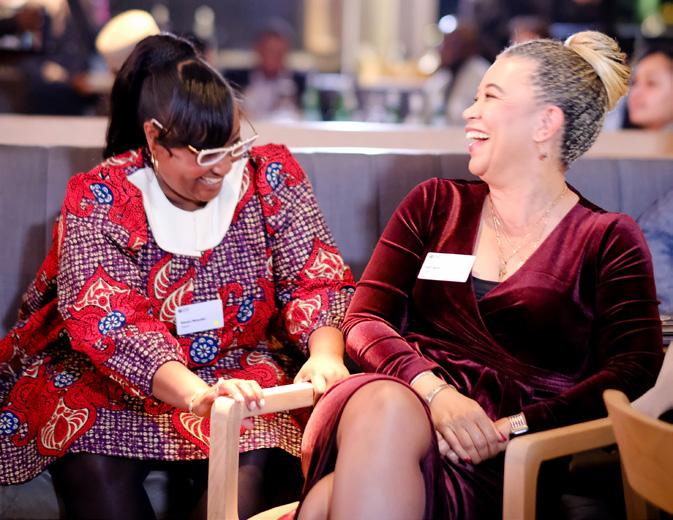
The pitch with a twist, which took place on 11 August 2022, kicked off with workrenowned comedian and actor Loyiso Madinga entertaining attendees with his unique brand of comedy.
It was then the turn of Joël Roerig, managing director of CIO South Africa, to reflect on some of the community’s biggest highlights in its first year since its official launch in March 2021.

He thanked the IT leaders in attendance for their ongoing support and for using the community for what it was intended to be: a place to network, exchange ideas, and expand their knowledge.
Joël then took the opportunity to launch CIO South Africa’s first-ever CIO magazine to its intended audience. Attendees were given an exclusive first copy of the magazine, which was a wonderful reflection of the incredible growth of the CIO community during its first year.
Guests were served delectable appetisers just before the interactive part of the evening – the poll questions – began.
Reabetswe Rabaji, managing editor at CIO South Africa, took to the stage next to explain – and facilitate –the entertaining and informative session. Through Mentimeter, the CIO South Africa Team posed a few “dilemmas” on burning topics. Attendees could vote live, using their cellphones for the most appropriate answer that best reflected their own situation.
The first dilemma posed the question: Who is your CISO reporting to? 32 percent of those who voted said their CISOs report to the CIO. On who their CISO should be reporting to, 37 percent chose CIO.
The next question, which asked who their CIO is reporting to, resulted in 41 percent of voters opting for the CEO. A staggering 59 percent said the CIO should be reporting to the CEO.
The second dilemma looked at loss of IT talent, with the majority of CIOs saying they were losing key IT team members to competitors. Opportunities abroad was the second most popular answer to the question and a minority said IT talent had decided to open their own businesses.
On the question of how to retain IT talent, most voters said by offering career paths with purpose and growth. The second most popular answer was to improve culture and EVP.
Another question on brain drain was on how companies are making sure that they have great IT skills, the majority said by growing their own talent, while the second most popular answer was hiring the best IT professionals.
Antionette Wagner, CIO at Deloitte, said, “We are not scared of brain drain. I think that is important – bringing in talent and developing young IT professionals.”
Josh Souchon, group CIO at Sasfin, added that the company had brought in an additional 15 percent of staff on a graduate programme to grow internal talent.
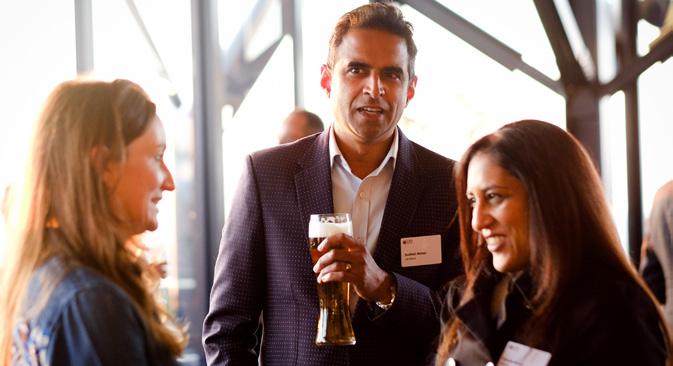
“To those who say they want to go work overseas, we are saying it's fine – go overseas but work for us. We’ve allowed high performers who want to work
overseas to go,” he said.
The challenge they were not able to solve, he added, was getting people who work overseas to work for them.
On how to grow talent, Josh said leadership development was fundamental in IT. “It’s not just about management, it’s about leadership.”
The third dilemma focused on the legacy monster and the first question was “Is your IT outdated?” Here 15 percent of respondents said they had state-of-the-art IT, while 11 percent said “It still works, but for how long?”. On how the Covid-19 pandemic has affected their companies’ appetite for IT investment, a resounding 32 percent of voters said it sped it up.
Nkosenhle Ngongoma, group CIO at Ascendis Health, said they had companies under their stable that had the best technology and those that had the worst IT systems. “We as CIOs and IT managers use Elastoplast in a lot of the systems we run just to get them running,” he said.
According to Faith Burn, CIO at Eskom, the power utility is in the process of updating its IT systems. “With regards to investments, it's pretty much the same at my organisation. Security, agility, flexibility are all crucial areas for us," she said.
During the highlight of the evening, the Pitch Parade, representatives from EOH, iOCO, Workday, SAS, Software AG, Accenture, and AppDynamics were given five minutes on stage to deliver their most impressive product pitches and wow the audience.
The audience waited with bated breath to see if five minutes would be enough to pique their interest. The partners were under pressure, but they all performed exceptionally, and some even had time to spare.
Guests were treated to the finest dining experience in
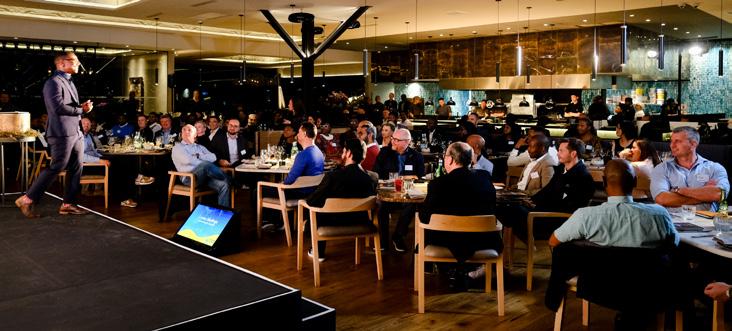
Johannesburg, which included a scrumptious threecourse meal prepared by Marble’s superstar chef, David Higgs, which included flame-grilled steak, linefish, as well as halaal and vegan options. This was followed by a delicious selection of desserts per table to satisfy everyone’s sweet tooth.
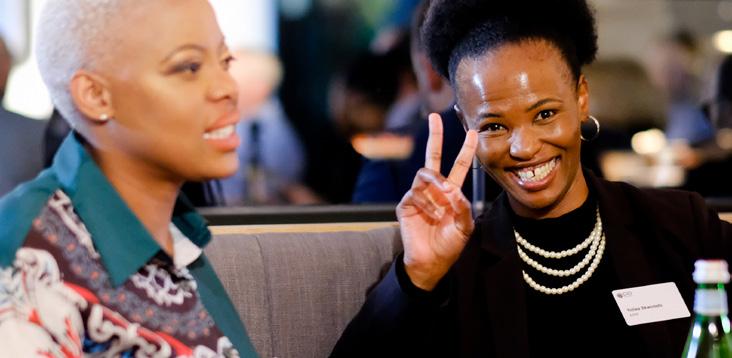
Then, Ziaad Suleman, EOH’s chief commercial officer, took to the stage to comment on all of the partner presentations as well as the well-received Mentimeter experiment.
Guests finished off the evening with a round of drinks and networking.
EOH has reached stability and considers itself a business at the forefront of the Fourth Industrial Revolution (4IR). Managing editor Reabetswe Rabaji sat down with Ziaad Suleman, chief commercial officer of the group, to learn why businesses need to step up their digital transformation and which emerging technologies will give them a competitive edge.
Q: Digital transformation has become an overused and often misused term. Is digital transformation in the true sense of the word still relevant for business?
A: Yes indeed. Businesses still need to grapple with digital transformation to remain relevant and thrive in the digital economy. This transformation is not only about updating technology but developing strategic thinking and business culture. New ways of thinking prepare the way for new ways of working, which is such a big trend today.
Q: What happens to businesses that neglect their own digital transformation?
A: Quite simply, they get left behind and may well lose their relevance. Business leaders who don’t take advantage of the opportunities of the digital era are forgoing growth and retaining talent. Increasing innovation and constant good disruption in business means that leaders need to be agile, ensuring that their offerings and business models are relevant and essential.
Q: How is the digital economy changing the dynamics in business?
A: In a digital world where business can’t only
count on customer loyalty, business leaders must ensure that their connectedness to their customers is based on the quality of their offering, on customer-centricity and ease of service, on fairness and value. Added to this is the requirement of customers, whether it be consumers or business, requiring instant service with zero latency. In order to achieve same, one needs to rely on technology to obtain efficiencies and scaling.
No longer can business be totally independent and self-fulfilling. Like technology requires integration, it is about building out a value-added ecosystem of partners that are complimentary.
Q: How should business leaders make sense of these shifts?
A: To unpack these complexities and make the correct business decisions, one cannot rely on one’s own business or industry insights. We need to augment same with data and artificial intelligence to enable rational, data-driven decision-making. Because the volume, variety and velocity of data is now unparalleled and increasing exponentially in complexity, it is essential to have a strategy to unpack both structured and unstructured data. The insights gained from data analysis can help businesses strategically differentiate themselves. Equally important in the digital age is the building
Ziaad Suleman is the group chief commercial officer at EOH. He was previously the chief operating officer at IBM Southern Africa. In fact, he worked for the technological company, holding various senior positions for years, before joining EOH in 2021.
Ziaad is also chair of the 4IR Digital Economy, representing South Africa at BRICS. In addition, Ziaad chairs two Presidential Commissions, Public Private Growth Initiative and Digital Work Accelerator (PPGI), and also serves as a group exco member at EOH across the entire group of circa 100 companies.
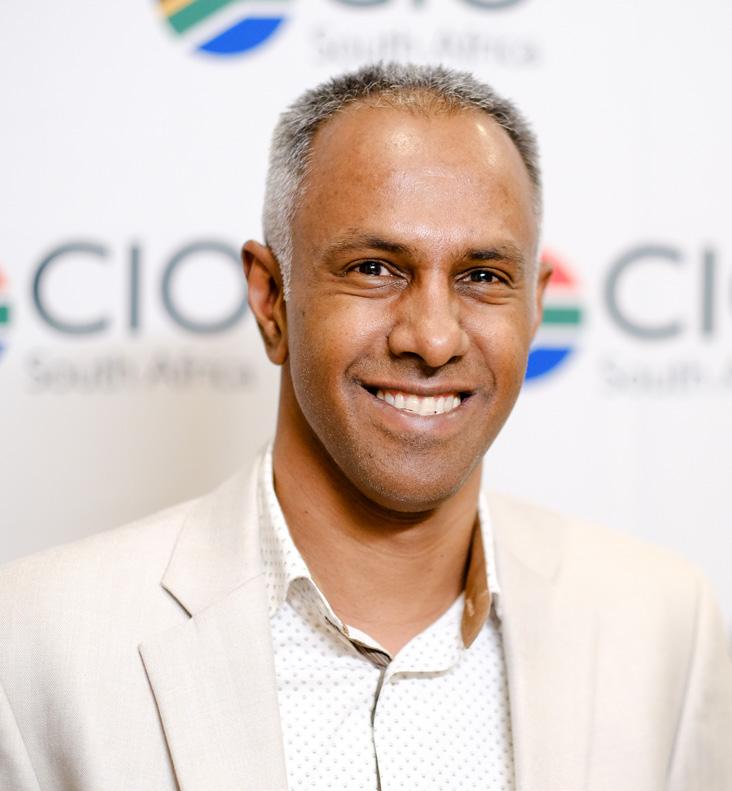
of platforms to leverage scale and to disrupt traditional partnering models in the industries where you operate.
Q: Which digital trends do business leaders need to watch this year?
A: A multitude of technologies are converging in the fourth industrial revolution (4IR), bringing us tremendous benefits and insights. We have data and artificial intelligence (AI) including ChatGPT, the cloud, the Internet of Things (IoT) including sensor technology, 3D printing, automation, blockchain and many more. These technologies provide us with better solutions, whether as a consumer, enterprise or society.
Q: Let’s get into the nuts and bolts of current tech developments. How will computing power take us into the next phase of digital transformation?
A: In this interconnected world where devices, appliances, computer systems and machines speak to each other and produce masses of data that require instantaneous processing, high-performance or Quantum computing is fundamental to the evolution of digital transformation. It requires considering optimally integrated systems, whether they are on-premise, off-premise or hybrid in the cloud. As the Data complexity increases and 5G
and 6G take effect, the need grows for better computational power and ESG measures.
Q: Going back to data. Why are data and data insights the key differentiators in business?
A: Masses of converged data from multiple sources such as mobile, email, social channels, workloads and sensor technology have value that can be unlocked through deep learning, machine learning and other forms of AI. Therefore, together with other aspects of the 4IR, the key elements of AI such as natural language processing, expert systems, robotics, intelligent agents, and computational intelligence must be infused into solution sets. The ultimate value derived from data insights depends on how business leaders apply those insights.
Q: EOH is at the cutting edge of the 4IR. What are you offering businesses that want to accelerate their digital transformation?
A: We offer the end-to-end capability of supporting customers along their digital journey including infrastructure, managed services, software solutions, operational technology, digital enablement and skills. We lead with advisory to co-create solutions that achieve customer objectives through our dedicated expertise.
• Cloud computing makes accessing data and applications easy as the functionality and services are delivered over the internet. The services can be as basic or as complex as required and include storage, networking and processing power, through to natural language processing, AI and quantum computing. Some of its primary benefits include scalability, flexibility, data storage, speed-to-market, accelerated development, lower adoption costs, enhanced security and a multitude of functional and “as a service” offerings.
• Robotic Process Automation (RPA) is another interesting technology for business. Put simply, this software streamlines time-intensive business processes by automating them. Examples include managing data, communicating with users on matters ranging from pricing to HR queries, processing transactions, and analysing and interpreting applications. RPA brings CIOs and companies the benefits of accelerated predictable outcomes and effective IT performance. Companies realise the obvious benefits of cost savings and efficiency, but also mitigate risk and improve customer experience.
• Edge computing. This has emerged to solve latency issues that have resulted from the increased volume of data on the cloud. It is designed to optimise the transfer of data to the data centres where it is processed. It exists “on the edge”, that is, closer to where the computing needs to take place and when the data needs to be processed. Only the most important data is transmitted to minimise latency. It is particularly effective when you need to process time-sensitive data to improve response times, especially in remote locations where connectivity is a challenge. The application of edge computing will grow exponentially as IoT devices become more widely used.
Yosheen Padayachee, group IT director at Tsebo Solutions, might be a biological technician by training with a BSc in Biological Science from the University of KwaZulu-Natal, but she soon discovered that her true passion lay in IT.
She landed a temporary position as an IT service desk co-ordinator at FNB while she was trying to secure funds to complete her studies.
“I was surrounded by a team of people who used to load machines and do fantastic IT-related work. This sparked my curiosity and I approached some of these individuals to teach me more about the work they were doing,” she says.
“Eight months later, a system administrator position came up and I applied, and got the job. From that position, I worked my way through all the IT disciplines, including system, LAN, network and voice administration. However, I felt quite frustrated because I would receive customer complaints but was unable to do anything about it. It was just too late in the lifecycle to help users,” she explains.
She went on to become a test analyst, then a sys-
tem analyst and held various other junior and managerial positions at FNB, spending over 20 years with the bank.
Yosheen’s first stint in IT leadership was when she joined Momentum as CIO for the rest of Africa. “I focused quite a bit on modernisation in that role and my team and I had some uphill battles to climb such as funding constraints and barriers to getting technology and buy-in into Africa, at the time,” she says. “Nevertheless, we came out victorious in that battle and worked on a few exciting projects and successfully rolled out a Health Platform and SD WAN network architecture to the rest of Africa; however, implementing robotic process automation (RPA) in our region was an even bigger move.”
Yosheen, who joined Tsebo Solutions as group CIO in 2021, points out that there are some very exciting things happening in the world of cleaning in terms of modernisation. She recently attended Interclean Amsterdam 2022 to learn more about the latest innovations in the sector.
Among the list of her academic achievements is a BCom degree in Informatics, master of management (MM) in technology and innovation from the
Tsebo
Group IT director Yosheen Padayachee is an advocate for women in tech.
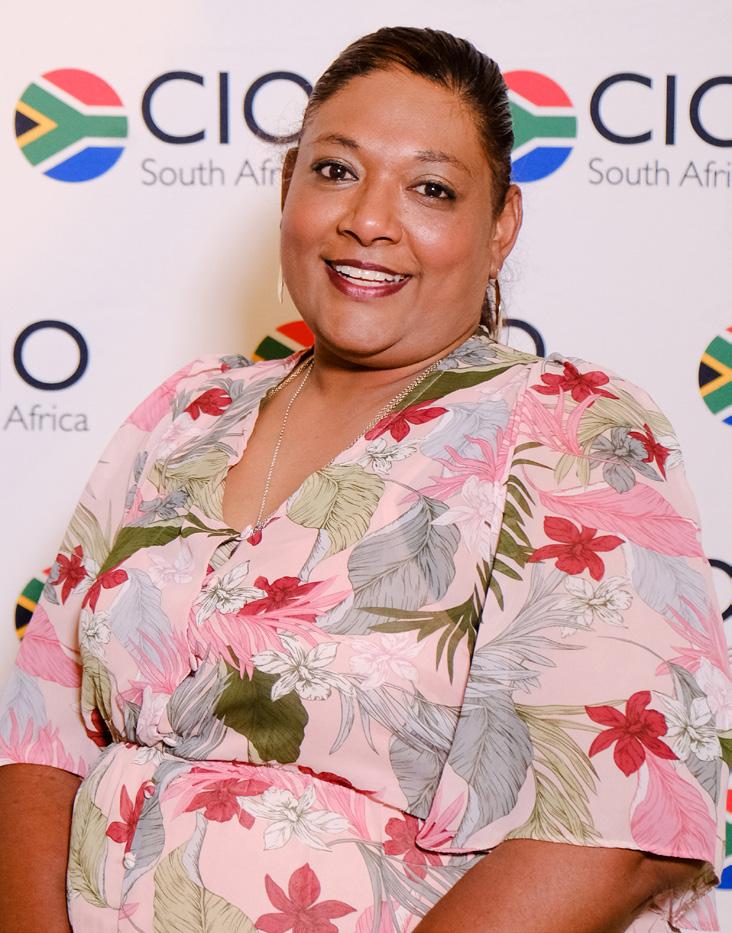
“Each role has its place and function, but one does not dominate or compete with the other.”
Da Vinci Institute of technology. She is currently pursuing her PhD through the same institution. Her thesis is on leapfrogging technology adoption in Africa and whether Africa can rapidly move forward with 5IR.
Confidence is key, especially as a woman in a male-dominated industry, Yosheen notes.
“I recall being approached by a former manager in my earlier years who once asked me whether I wanted to be a mother or wanted to have a career. My response was simple: I wanted to do both. In fact, his statement motivated me even more – that’s why being courageous is important, especially when you are underestimated,” she says.
“Let the work speak for itself and always deliver. Be respectful, but also demand it and never compromise your values and principles, no matter how badly you want to make it.”
While the IT industry is male dominated, this doesn’t mean that there are not any men out there willing to support women. “I have had some great male mentors throughout my career and from an organisational culture perspective, I’ve been fortunate enough to have worked in environments where favouritism was virtually non-existent because of these open-minded individuals” she continues.
Each woman’s experience is different, she notes, but one thing women should always keep in mind is to remain factual. “It’s okay to get emotional at times,” she says, “but sticking to the facts can get you even further.”
Yosheen is actively involved in women empowerment initiatives. “A former colleague and I, Eugene Brockman, helped launch the ‘women in technol-
ogy’ programme at Momentum and this initiative continued to run even after I’d left the company,” she notes.
She highlights that financial planning is just as important as professional knowledge and she encourages her mentees to set money aside every year to upskill themselves.
“I’ve mentored three women thus far who are keen on understanding business and the steps needed to be taken to get to where they want to be. I did this through a national mentorship network I am affiliated with. In my personal capacity, I’m part of the ‘women in motion’, a closed community of women that myself and a few friends and relatives started. It has really grown into a movement over the years, where we host events and exchange ideas on how we can uplift other women,” Yosheen says.
“It is okay not to be perfect,” she advises her mentees. “I say this because women who are careerdriven, wives and mothers tend to experience a lot of pressure to be successful at work and the best mom at home. Don’t strive for perfection: it puts unnecessary pressure on you. Strive to be present in whatever you are doing and most importantly strive for balance.
“In addition, give your family the time and attention they need, but there are times when work will require your full attention too and your family understands this when work is prioritised,” she adds.
“Each role has its place and function, but one does not dominate or compete with the other.”
When she has some free time, Yosheen enjoys trivia, the occasional DIY class at her local hardware store and a little pampering at the spa, which she describes as the most therapeutic time she has to herself.
“Let the work speak for itself and always deliver Be respectful, but also demand it and never compromise your values and principles, no matter how badly you want to make it.”
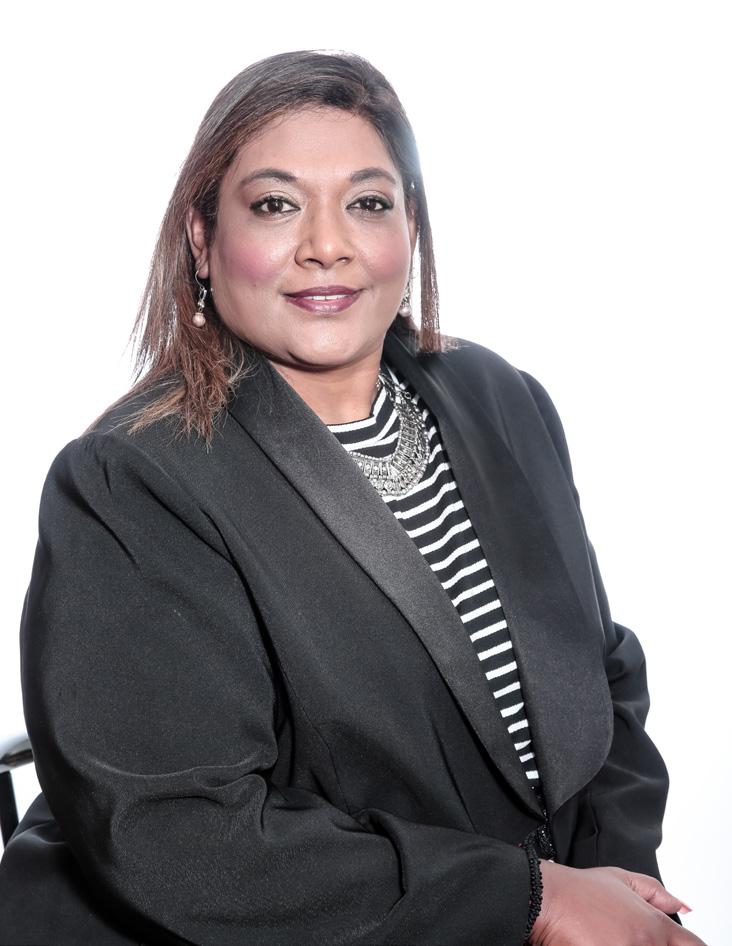
Almost overnight, AI has shifted from Deep Blue to being part of the zeitgeist. Yet, due to cost, a lack of skills, and even uncertainty, many South African CIOs aren’t yet leveraging its power. Here’s why it’s time to get on board –or get left behind.
 BY ANG LLOYD
BY ANG LLOYD

Artificial Intelligence could contribute up to $15.7 trillion to the global economy by 2030, according to PwC.
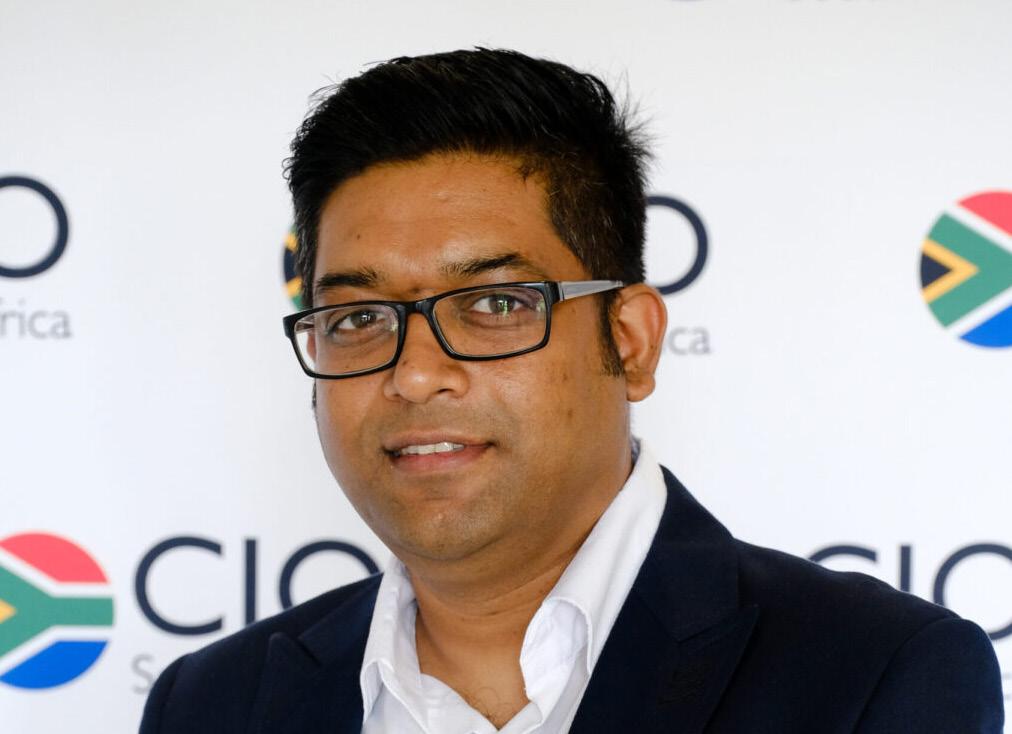
To understand how we’ll reach those heights, we need to look at how this revolutionary technology started.
In a 1950 paper entitled Computing Machinery and Intelligence, mathematician Alan Turing posited building machines that could make decisions and solve problems. In this paper, he also introduced the ‘Turing test’, whereby a machine could be deemed ‘intelligent’ or not (today’s CAPTCHAs are a type of Turing test).
Not only did he introduce the mathematical possibility of AI, but he also figured out how to decrypt World War II German ciphers in his code-breaking group, Ultra. In addition, he turned a computer into a musical instrument (one could say the polymath was also responsible for the genesis of doef-doef).
In 1956, an eight-week conference was held at the Dartmouth Summer Research Project on Artificial Intelligence. It was here that the Logic Theorist
was presented. Designed to automate reasoning and mimic human problem-solving, it was the first AI computer programme. Nearly 50 preeminent scientists attended the conference, and the event would prove influential in paving the way forward for early AI.
As computers advanced, so did AI. By the 1970s and ‘80s, funding and expectations were high – but the technology wasn’t there yet. As an example, between 1982 and 1990, the Japanese government pumped $400 million into their Fifth Generation Computer Project, where they aimed to ‘build a new kind of computer’ and revolutionise AI. However, the project was shuttered. Despite setbacks, AI would continue to evolve and the technology hit significant milestones in the ‘90s, including Deep Blue beating Garry Kasparov in a game of chess (IBM’s supercomputer could evaluate 200 million chess positions per second).
“I did the first AI course in Africa at Wits in the mid-'70s,” says Steven Boykey Sidley, professor of practice at the Johannesburg Business School and head of the Blockchain and the Cryptoverse
Research Group at the Institute for Future Knowledge, both based at the University of Johannesburg.
Back then, Steven was an aspiring jazz sax player, and his interest in AI was a little left field. He wanted to synthesise improvisation into a set of algorithms – his honours research was based on this and published in an artificial intelligence journal. Since then, he has thought a lot about what AI means for humanity.
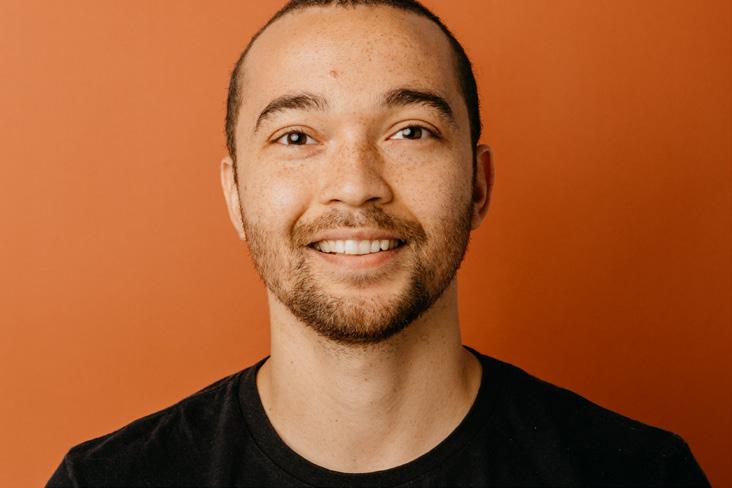
“I was convinced that AI would advance; there was no question in my mind that it would get to where we are today,” he emphasises. “There's no question either that we'll end up with super-human intelligence because it's the only technology that exponentially self-learns.”
SnapScan CPTO Kurt Kruger admits that he’s guilty of not extensively exploring how he can leverage AI for his organisation’s product lines. While AI hasn't significantly impacted his role yet, he foresees that he’ll likely need to adopt some aspects of the technology into his workflow.
“It's tricky because AI isn't a panacea for the problems
that CIOs and CTOs generally try to solve,” explains Kurt. “Especially with Large Language Models (LLMs) like ChatGTP. Since they are stochastic, they're great at generating plausible bodies of text based on what already exists, but they're not great at predicting the future.”
However, Kurt believes that CIOs and CTOs who are not using AI to optimise their time are losing out, big time. “You're leaving money on the table; LLMs are great at summarising and explaining things, and having a companion that can ingest and give technical and behavioural breakdowns of new products and technologies saves hours of daily effort.”
SnapScan plans to introduce multiple forms of AI into their product lines in the coming years, but Kurt admits it’s difficult to keep pace with the new literature, and the fact that his industry – fintech – keeps changing at an increasing pace.
For CIOs and CTOs, this is an all-too-common scenario, according to Steven – and even he can’t keep up with the innovation. “CIOs and CTOs absolutely must stay on top of AI, which is an extremely difficult task as there's a tsunami of information happening right now; I follow
it closely and there are 100 announcements a day,” he says.
As a former CTO for Anglo-American, Steven advises that CIOs need to create a sandbox where people can play. “Without a sandbox, you don't get to touch and feel the technology; in the chaos of innovation, the best thing is to give people the freedom to try different things.”
Steven suspects that, due to the lightning-fast pace of change, many CIOs and CTOs are unsure of what to do with AI, so they must ensure they have the right person to advise them.
“Simply listening to a trusted vendor and waiting to see what they release in terms of AI is a poor strategy because the corporation up the road will go to the sandbox and outplay them,” he cautions.
Yasvanth Singh, former Group CIO at Lesaka Tech, agrees that tech leaders need someone to lean on, but South African CIOs and CTOs face skills shortage challenges to boot, especially in small- and medium-sized enterprises.
“If you’re implementing AI in your organisation, you'll probably have to insource or outsource some of these skills. It also becomes a cost issue because emerging tech, if it’s not open source, is still relatively expensive, especially in the current economic climate,” says Yasvanth. “Many small- and medium-sized enterprises just don't have the skill set, or the money, to invest in this technology – so we need to do it organically.”
By ‘organically’ Yasvanth means that tech leaders should slowly introduce technology like AI into their organisations, and there needs to be a sharing of skills. “We need more operational experts and specialist consultants who we can lean on and who can advise us,” adds Yasvanth. “That's what we're lacking. With emerging technology, there are few local vendors to lean on, but I believe this will change as the industry changes to adopt this technology because there will be a greater demand.”
Pre-ChatGTP, he conducted research for his MBA into emerging technologies like AI, Robotic Process Automation, and machine learning. He found that human-computer hybridity (HCH) – when AI and humans augment, and not replace, one another –is key to an organisation’s competitiveness. This ‘hybrid intelligence’ is about finding the balance
between human strengths, like creative thinking, and computational power, like quickly sifting through swathes of data. For Yasvanth, AI should enhance our capabilities, not usurp them.
As part of his MBA, Yasvanth devised a framework for organisations to use when creating an elastic, scalable, and agile organisation. “AI was one pillar of this framework, with leadership at the centre to enable the human workforce, hybridity, and elasticity,” he explains. According to Yasvanth, with emerging technology like AI, an organisation needs the right skills to implement the tech, and its leadership also needs to have emotional intelligence.
Yasvanth explains that an organisation’s leadership must understand that any big changes will impact lives and livelihoods. There’s the temptation to implement a technology like AI at speed – because every day you wait, you fall behind – but for Yasvanth, it should be slowly and responsibly implemented, especially in a South African context.
“You need to be cognisant that there may be psychological trauma on some people,” he adds. “Some employees will become redundant, especially in South Africa, as we have a large, unskilled workforce. Some people will be able to upskill and others won’t. Without having empathy and understanding the potential, underlying psychological impact on your employees, it's hard to implement AI in an organisation successfully.”
Compared to China’s AI advances – according to the International Data Corporation, it aims to double its investment in AI to $27 billion by 2026 – South Africa lags behind. However, analysts note that if the continent could only capture 10 percent of the global AI market, this could contribute to half of Africa’s current GDP. That’s a massive opportunity, and South Africa isn’t sitting idle.
Borne out of the Presidential Commission on the Fourth Industrial Revolution in 2019, the Artificial Intelligence Institute of South Africa positions itself as an “innovation engine”. In collaboration with the Department of Communications and Digital Technologies, the University of Johannesburg (UJ), and the Tshwane University of Technology (TUT), it was officially launched in November 2022. AI projects have been set in motion at both TUT and UJ that will benefit several sectors, including the mining, agricultural, and motor industries, as well as
digitally transforming public services by building a government data cloud.
In 2023, an Africa-centric AI hub called Lelapa AI was launched. Backed by Mozilla and Atlantica, the hub focuses on research and has a product lab. It aims to advance responsible and African-centric AI practices so that Africans create technologies that solve African-specific challenges. Planned projects include training AI language models in southern African languages and text mining to facilitate the return of African artefacts from museums in the Global North.
AI is now a part of our everyday lives. From algorithms serving you what series to binge-watch to helping diagnose cancer, drone automation to checking your grammar, the future feels limitless. It’s a little frightening, too, considering quantum computing, the realm of sentience, and the possible end of the world as we know it.
“I got my kids to use ChatGTP because when the cal-
culator came out, it was also feared,” says Yasvanth. “Technology changes so quickly, and the future is going in a certain direction – what that direction is, no one knows.”
Kurt believes that AI should be viewed as a complementary tool and that humans still play a crucial role. “We've already seen an ecosystem of AI-powered developer productivity tools get built this year alone. These tools should be used to speed up research, problem-solving, and delivery. The core underpinnings of the software engineering field will remain unchanged: provable correctness, legibility, and maintainability. These require human intervention –for now.”
Concludes Steven: “I'm convinced AI is going to outpace humanity in just about everything we do, and I think it's going to happen more quickly than anyone thought. We have never dealt with a technology that learns autonomously; we don't understand what that means to us, and we can't predict what will happen.”
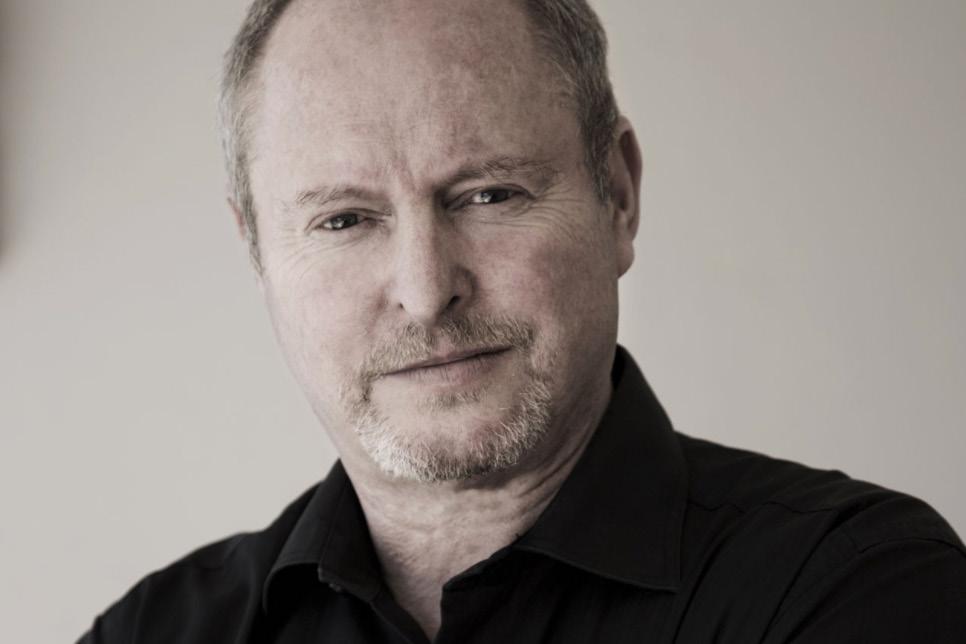
I joined CIO South Africa as its community manager at the start of the year, when the opportunity was presented to me to take up the role. There are a number of reasons I accepted the offer.

Firstly, it was an opportunity for me to step out of my comfort zone after having been a journalist for more than a decade. Even though I joined CFO Enterprises as a managing editor last year, I was still doing a lot of writing and was very comfortable in that role. Secondly, I want to contribute to the growth of CIO South Africa, which is only two years old this year.
I must admit that I was a bit anxious when I took on this job because I did not know much about technology and I was worried I would struggle to understand tech jargon and what CIOs actually do. What has really helped is knowing that with AI tools such as ChatGPT, I can just ask it to explain whatever phrase I am struggling to understand and it simplifies it for me.
I have been fortunate to meet incredible CIOs, who have not only welcomed me to the community, but have offered to guide me as I find my feet. It has also been amazing to meet new CIOs who are keen to join, contribute and grow our community.
One of my duties as the community manager is to make sure that as CIO South Africa, we bring value to the community by offering a platform where CIOs are able to learn from each other and from experts in the technology industry, and where they are able to network and build long -lasting relationships.

The top-notch events we have hosted so far have proven that we are doing a fantastic job in community building, which is the main reason why we exist.
We recently hosted the CIO Summit in Cape Town at one of the most magnificent venues I’ve ever seen, 180 Lounger, which is one of the tallest buildings in the Mother CIty.
This was the first CIO event at which I got an opportunity to formally introduce myself and facilitate a panel discussion. It is always nerve-racking to stand in front of a crowd and I was not sure how they would receive me, but I remember the smiles and the nods I got as I was speaking.
I was overwhelmed by the hugs and handshakes that came after the event with congratulatory messages on a job well done to us as a team for pulling off yet another successful event this year.
I fell asleep that night with a big sigh of relief that the event was over, but also with a sense of pride. I am really excited to be part of this community and I look forward to many more success stories.
Yours sincerely,
Nomahlubi Sonjica Community manager nsonjica@cio-sa.co.za +27 71 855 9261Support the new and growing CIO community with a membership that gives you an opportunity to expand your professional circle.
Your membership allows CIO South Africa to keep growing.
A membership is also the best professional gift for two of your direct reports. They will be able to attend and benefit from all CIO events, receive all editions of CIO Magazine and be invited to join bespoke CIO Community Conversations.
Meant for: CIOs, CTOs, IT Directors and up to two handpicked senior direct reports.
IMMEDIATE BENEFITS:
»Exclusive invite to CIO SA Community Conversations
»All issues of CIO Magazine delivered to your desk
»Support the CIO South Africa community
»Exclusive invite to all CIO Summits
»Exclusive invite to CIO Awards

»Exclusive invite to CIO Day
»CIO Newsletter
CORPORATE MEMBERSHIP INVESTMENT:
R40,000 ex VAT per annum
Terms and Conditions
CIO South Africa reserves the right to decline memberships.
6 July 2023
CIO Day
2 August 2023 Women's Event
7 September 2023
CIO Pitch Parade
11 October 2023
Executive Day
15 November 2023
CIO Awards
7 March 2024
CIO Summit Johannesburg
16 May 2024
CIO Summit Cape Town